Traveling to Ghana is an experience that can only be explained with so many words. The vibrancy of its cities, rich culture, and spice-filled foods are just a few aspects of Ghana’s charm you have to look forward to.
Ghana is a country whose reputation has been on the rise over the last few years and continues to rank as a desired place to travel for many—with good reasons that I’ll cover in this Ghana travel guide.
Ghana is my favorite country. My first time in Ghana was in 2019 on a solo summer study abroad program. Ghana was the first country I learned to travel solo in, and it was my first exposure to the world of traveling!
In 2021, I received the opportunity to move to Accra in August for two years to pursue my Master’s degree. As a study abroad student turned expat, I have been in awe of Ghana since.
[Last Updated: December 2024]

Table of Contents
ToggleEvery day is an adventure for me here, and I’m confident you will enjoy exploring the corners of Ghana on your visit. Accra offers its visitors a little bit of everything from cultural traditions to modern establishments.
While Ghana has a great reputation, I’ll be the first to admit that navigating the country can be tricky if you don’t know certain things. This Ghana travel guide is filled with tips and everything you need to know about traveling to Ghana to make the most of your trip!
This blog post may contain affiliate links which means that if you book one of these activities using my link (which I know you will because you loved how helpful this blog post is *wink*I am going to receive a small commission at no additional cost to you. Thank you for supporting BCJ!
Other Posts About Ghana You May Find Helpful:
- 80+ Things to Do in Accra
- Uber in Ghana: 10 Things You Need to Know
- Local Food Restaurants in Accra
- Restaurants to Try in Accra
- How to Ride A Tro Tro in Ghana
Getting to Ghana from the United States: Direct Flights
While Ghana is a destination that is high on the travel lists of many, the high price points for flights to get to Ghana from the U.S. and even flying from certain African countries deters the journey.
Getting to Ghana from the States used to be a lengthy trip (20-30 hours). It was a long journey due to the layovers that are included in most flights.
Thankfully, getting to Ghana can now be done in 12 hours with several direct flights offered by United Airlines and Delta.
I usually take the United flight from the Washington Dulles International Airport (IAD) to Accra. While it was not the best flight in terms of comfortability, food, and entertainment options available, I got to Ghana quicker than I ever have before so a win is a win!
The direct flight with Delta goes from the John F. Kennedy International Airport (JFK) in New York City to Accra. I have flown this route once going from Accra to NYC and it was an amazing experience because I upgraded to Premium Select, which is one class fare below Business Class and was very comfortable.
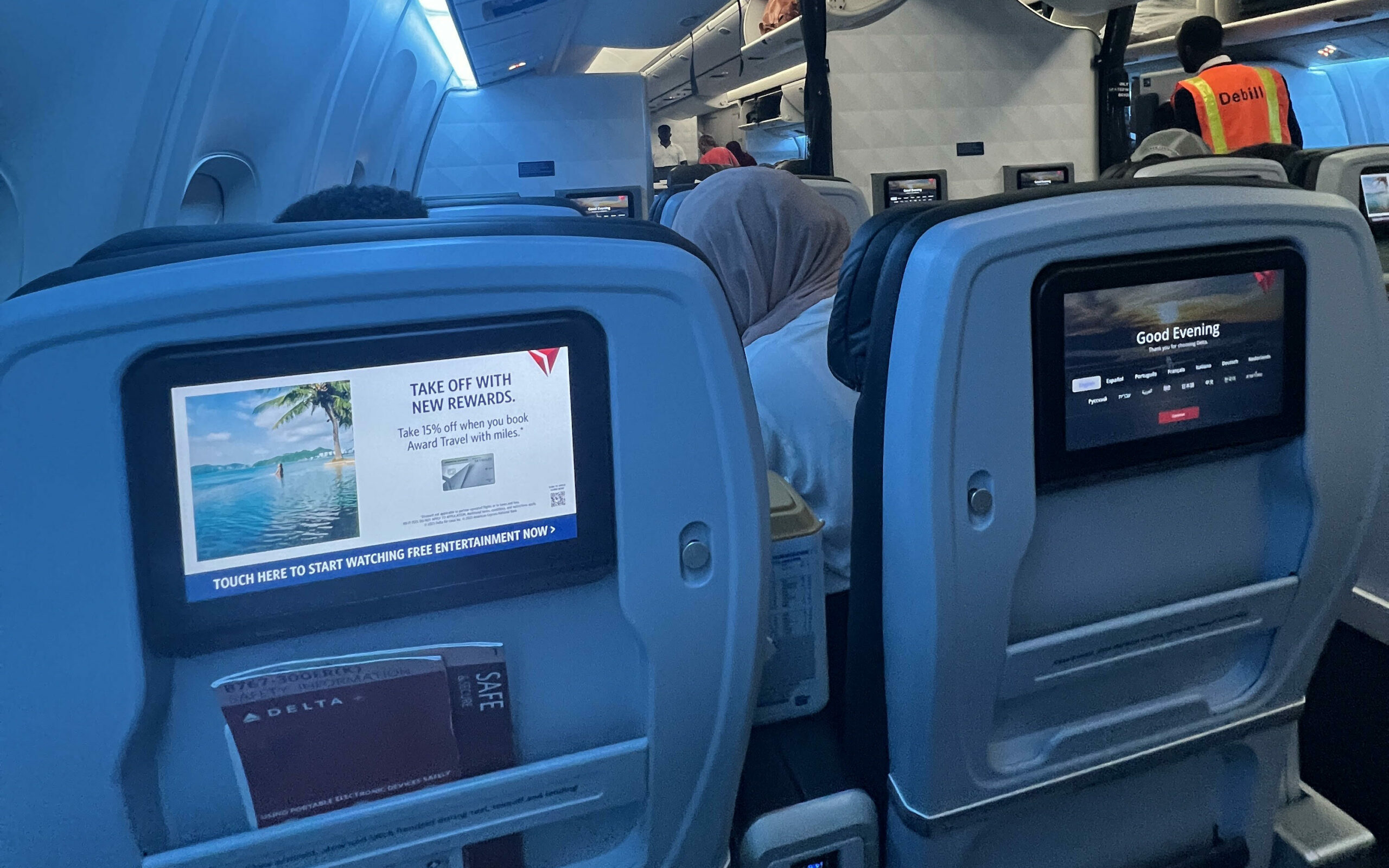
Tips for Buying Flights to Ghana
The cost of flights from the U.S. to Ghana is about $1,500 on average and can get as high as $2,500 for an economy seat ticket. However, there are small hacks to lessen the cost of airfare.
Choose Your Departure Airport Wisely
Airports based in popular cities like New York and Washington D.C. tend to have the best flight options to Ghana. This is because the layovers are shorter, and ticket prices tend to be cheaper. Although I live in Southwest Florida, I often fly to Ghana from New York with Qatar Airways, which includes a layover in Qatar, because the price is always right.
Booking two separate flights (one from Florida to New York, then New York to Ghana) is usually still cheaper, even with baggage fees.
Compare the flights from different airports around your country and see which offers the best deal.
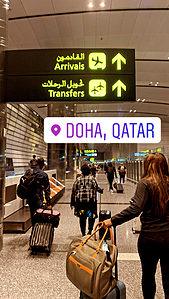
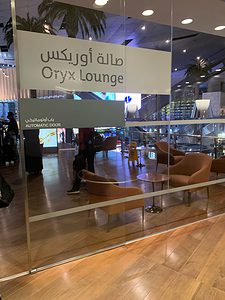
Chase the Deals, Not the Dates
Use apps and platforms like Google Flights, Skyscanner, and Skiplagged to track flights to Ghana from your preferred airports! I’ve gotten a roundtrip flight for $850 from the JFK Airport in New York with Qatar Airways. Cheaper flights may include long layovers and multiple flights, but it is still a money saver. Keep your dates open and flexible so you can book a flight once you find a great deal!
Pay Your Flight in Installments
Another great option for getting your flight to Ghana is using Airfordable. Airfordable allows you to book your flight by paying a portion of the ticket upfront and the remaining amount in installments. The company does charge a service fee but does not check your credit score! You have to use Airfordable at least 19 days before your departure flight, so keep this in mind if this sounds like an option you want to consider.
Visa Requirements for Ghana
Whether or not you need a visa to visit Ghana will depend on your nationality and the agreements Ghana has with your home country. Nationals from Member states of the Economic Community of West African States (ECOWAS) are allowed to visit Ghana visa-free for up to 90 days.
Can I Get a Visa Upon Arrival?
Citizens of countries in the African Union that are not part of ECOWAS can obtain a visa on arrival valid for 30 days after paying the required fee, usually $150. A full list of member countries can be found on the African Union website.
The Ghanaian government has been known to allow visa on arrival for international travelers to obtain without prior approval from a limited time period during the month of December, extending into January. This visa will be granted upon entry to Ghana, where you will be expected to pay a fee if you go this route.
Knowing how things in Ghana can be, I would highly recommend taking the necessary steps to get a visa before you arrive, but it’s good to know the option for a visa upon arrival is there should it be necessary.
How to Apply for a Ghana Tourist Visa As A U.S. Citizen
I wrote a blog post on how to apply for a Ghana visa, but unless walk-ins are allowed at specific embassy and consulate locations, you will most likely be sending your passport in the mail along with the other documents we will cover to get your visa placed inside your passport.
For U.S. citizens, a visa can be applied for through the following embassies and consulates, each having their own set of requirements for how to apply:
Decide on whether or not you want a single-entry or multiple-entry visa. If you are visiting Ghana and have no plans on returning after your trip anytime soon, a single-entry visa will be best and is typically around $60. A multiple-entry visa ($100) is best if you even think you will return to Ghana within the next few years, OR you plan on traveling to neighboring countries and then re-entering Ghana.
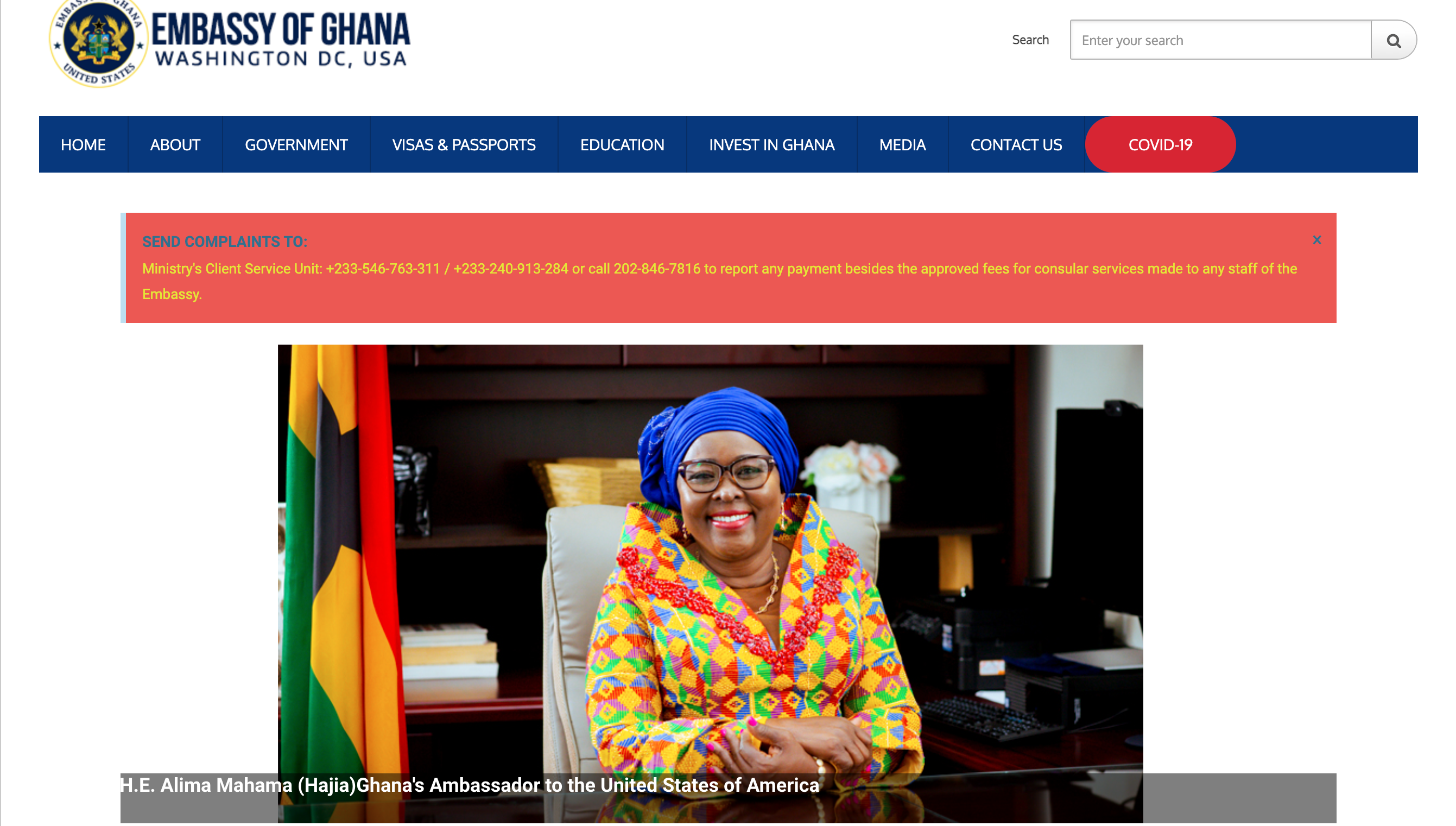
You will have to compile documentation and meet requirements like obtaining passport pictures, ensuring your passport is valid for at least six months and providing a copy of your flight itinerary that shows proof of your return flight.
Ghanaian embassies and consulates are known for getting backlogged, especially around December and summertime. Be sure to send your visa application and passport at least 1.5 months before departure. Pay the rushed fee if you are not confident that your passport will come in time. Once you get your passport back, you are set to head to Ghana!
What are the Entry Requirements to Visit Ghana?
Besides a visa, you must meet other entry requirements to visit Ghana. All visitors to Ghana must be in possession of a passport or legal travel documents of 6 months validity.
The entry requirements for visiting Ghana are subject to change at any moment, and you can review the latest entry requirements on the State Department’s website or your local Ghanaian embassy if you are not a U.S. national.
Are there any vaccines I have to take to enter Ghana?
- Proof of yellow fever vaccination upon arrival in Ghana if over nine months old.
- Vaccination against malaria is not required, but it is highly suggested to get malaria pills before traveling to Ghana as a preventative measure.
Where is Ghana Located?
Ghana is situated on the Gulf of Guinea, bordered by Cote d’Ivoire to the west, Burkina Faso to the north, and Togo to the east. Its southern coastline stretches along the Atlantic Ocean, offering picturesque beaches and fishing communities.
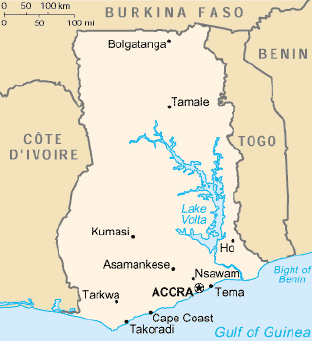
Brief History of Ghana
Formerly known as the Gold Coast, due to its abundance of gold as a natural resource, Ghana’s history is often described as “rich,” and it isn’t without reason. Gaining its independence in 1957, Ghana became the first sub-Saharan African country to do so and set the tone for Pan Africanism and unity within the region. Today, Ghana receives over 300,000 international visitors annually, sharing its extensive history with guests worldwide.
Helpful Things to Know Before Visiting Ghana
• Capital: Accra
• Time Zone: Greenwich Mean Time (GMT) or Coordinated Universal Time (UTC).
• Language(s) Spoken in Ghana: English is widely spoken in Ghana and is considered the official language, but the country is home to several ethnic groups. Languages such as Twi, Ewe, Ga, Krobo, Frafra, and more are spoken among members of the same ethnic groups.
• Currency: Ghanaian Cedi GH₵

How Many Regions Are in Ghana?
Ghana’s rise in popularity can easily be accredited due to its booming capital, Accra, but you may be surprised to know that Ghana is composed of 16 regions as of 2018.
Each region in Ghana has something to offer the country and is worth seeing.
Greater Accra gives a busy city vibe with massive traffic, while the Volta region is known for its lush tropical landscape.
Having visited 7/16 of the regions in Ghana, I highly recommend getting out of Accra during your visit and at least exploring Cape Coast thoroughly if you can. It will give you an entirely new perspective on Ghana.
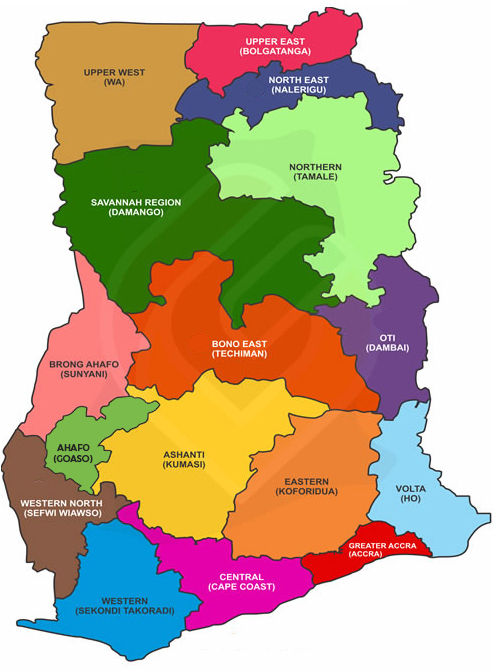
A list of the regions in Ghana and their capitals:
| Region in Ghana | Capital |
|---|---|
| Ahafo Region | Goaso |
| Ashanti Region | Kumasi |
| Bono East Region | Techiman |
| Bono Region | Sunyani |
| Central Region | Cape Coast |
| Eastern Region | Koforidua |
| Greater Accra Region | Accra |
| North East Region | Nalerigu |
| Northern Region | Tamale |
| Oti Region | Dambai |
| Savannah Region | Damango |
| Upper East Region | Bolgatanga |
| Upper West Region | Wa |
| Volta Region | Ho |
| Western North Region | Sefwi Wiawso |
| Western Region | Sekondi-Takoradi |
Navigating Money in Ghana
The currency used in Ghana is the Ghanaian Cedi. You can use this currency converter to see how much your money is worth in cedes, depending on what currency you are converting from once you arrive in Ghana.
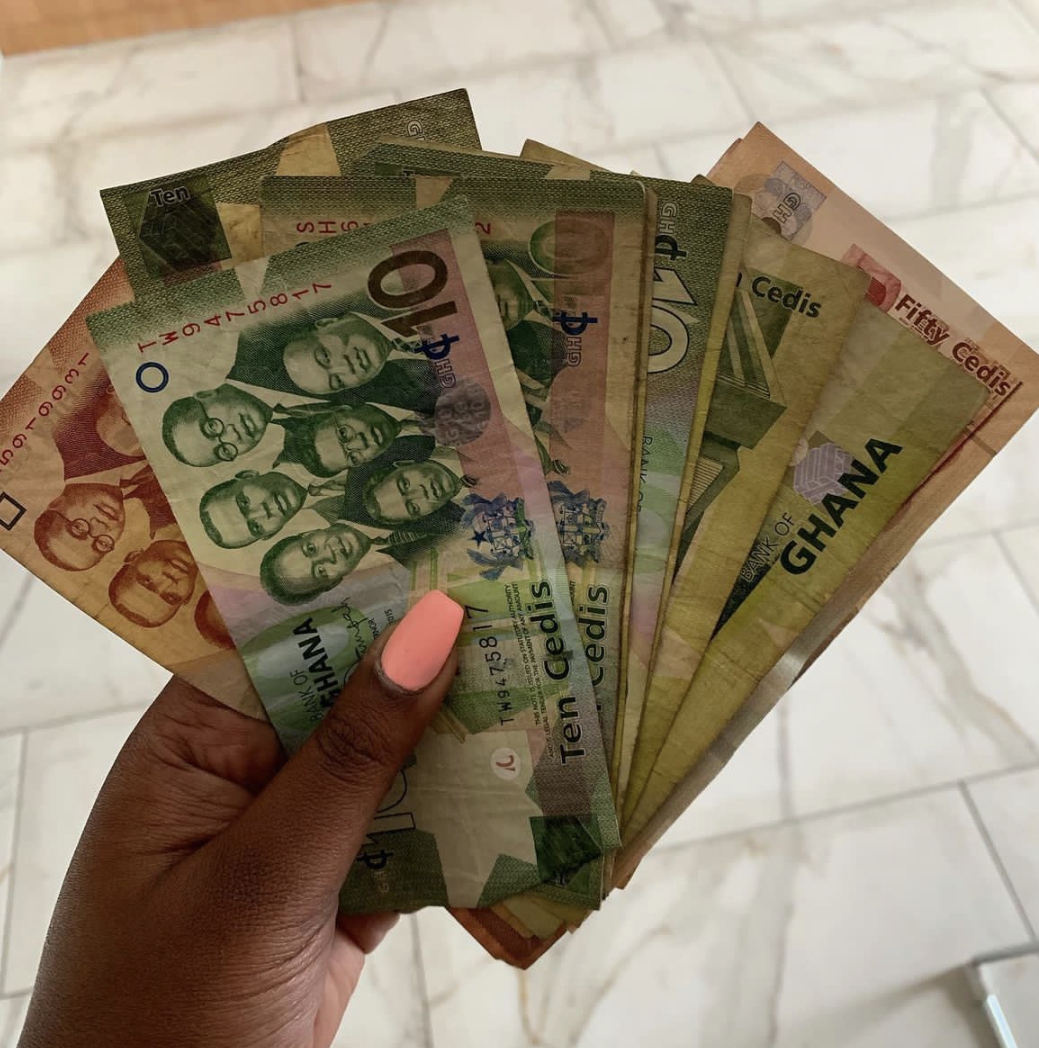
Where Can I Exchange My Money for Ghanaian Cedis?
There are foreign exchange bureaus located around Ghana that exchange money in cash for Ghanaian cedis. You can ask around, will see the offices as you drive through different cities, or can search on Google to see which offices are located near you. If you use Forex bureaus in Ghana, be sure to have larger bills like 50s and 100s to get a higher exchange rate on your money. Smaller bills like 1s, 5s,10s, and even 20s (in U.S. currency) will get less of an exchange.
The easiest way to get cedis is by using an ATM. There are ATM machines you can use at the Kotoka International Airport in Accra, where you will most likely fly into. I recommend withdrawing about 1500 cedes at that time to start your trip (if you are planning your own trip and not joining a group where certain things, like food and transportation, will be included).
However, you can ask a taxi driver or even an Uber driver to stop at an ATM on your way to your accommodation if you do not have the local currency available.
If you have left the airport or are not flying into Ghana, ATMs can be found at bank branches around Ghana. They usually charge a small fee to withdraw money but are reliable. If you know you will be in Ghana for a while or plan to spend like there is no tomorrow, withdraw a large sum of money to avoid these fees! Stanbic Bank is a great bank to withdraw large sums of money from, while many other banks will only let you withdraw up to 1,000 cedis at a time.
How Much Money Should I Bring to Ghana?
How much money you bring to Ghana depends on two factors: 1) How long you are staying and 2) The type of traveler you are. If you are a budget traveler, your money will last a while. On the other hand, if you want to live it up on your trip and do and see everything, you may find yourself running to the ATM every day. Regardless, I recommend bringing as much money as possible to Ghana, even if you do not intend to spend it all. The more money you have, the more you will be able to do!
For a one-week trip, I recommend $1,000 (after your flight and accommodation), but it all depends on the experience you want in Ghana. For example, breakfast can cost $2 or $15 depending on if you eat from a chop bar or modern restaurant. Transportation can be $0.50 a ride or $5 depending on if you use a tro tro or an Uber. Read my “Ghana on a budget” article I wrote for Lonely Planet for more tips on traveling to Ghana on a budget.
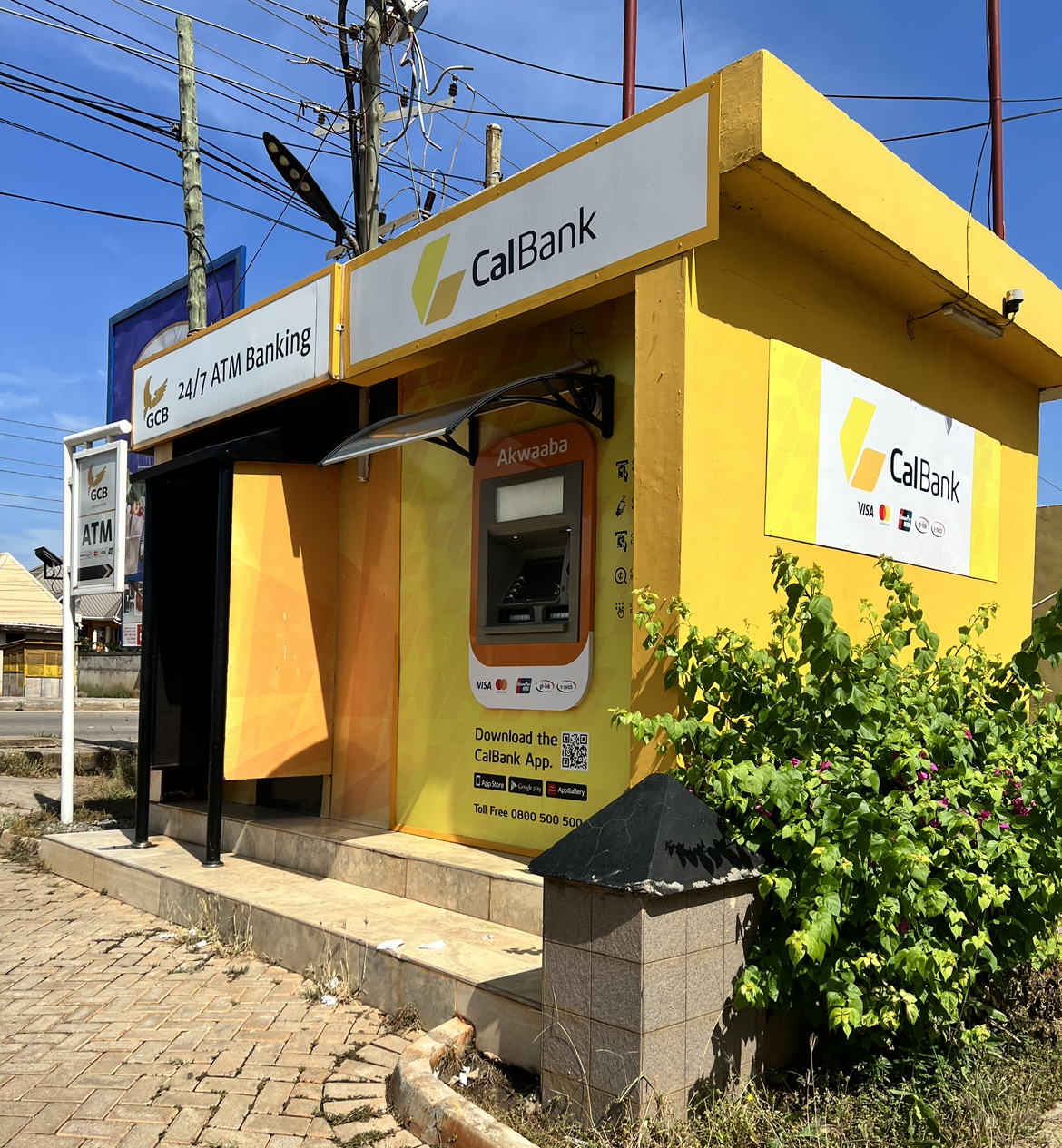
Using Cash in Ghana
Cash is king in Ghana, and it is best to always have cash on you, as you will make most of your purchases with cash.
Modern restaurants and other establishments like the Accra Mall accept card payments. WiFi connection in Ghana goes in and out, and network issues often cause card processing machines to be out of service.
Try to make it a habit to ask staff members if their card machines are working before browsing a store, ordering at a restaurant, or accepting a service (like at a hair salon) to avoid any issues. I’ve had to run to the ATM many times after services because the store’s machines were down!
Using Credit and Debit Cards in Ghana
When the machines are running, some stores only use card processors that accept debit cards, not credit cards. You may be used to being able to “bypass” entering your pin on a machine by pressing the enter button, but some machines in Ghana do not have this option. The staff member will inform you that it can only be used with a pin. I recommend carrying both a debit and credit card with you for this reason.
As you can see, navigating money in Ghana can sometimes be tricky. It is best to always carry cash in Ghana and stay prepared with alternative payment methods. Don’t forget to notify your bank that you will be traveling to Ghana, so your card does not get blocked abroad.
Mobile Money: What Is It?
Often referred to as “Momo Money,” Mobile Money is similar to platforms like Cashapp and Venmo, except the money is linked to a digital wallet on the user’s phone instead of a third-party app. As mentioned before, Ghana is a country that uses cash heavily, and this can be annoying at times, so many people prefer to use Mobile Money. The money is held in the digital wallet and is password protected. It eliminates the need for physical cash. Suppose you want to place a delivery order with a business. In that case, they will often ask that you send a deposit or the total amount to them before dispatching a driver to your location.
To use Mobile Money, it has to be installed while you are getting a SIM card with the telephone provider of your choice. Be sure to ask the representative helping you what the prompts are for checking your balance and sending money to others.
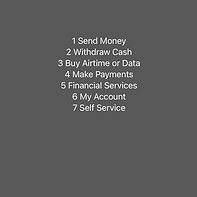
Alternatives to Mobile Money
If you are visiting Ghana for a short time (2 weeks or less), I would not worry too much about Mobile Money. Instead, you can use apps like Western Union or Remitley to transfer money to the Mobile wallets of others or give the money to a Mobile Money vendor (which can be found along roadsides all around Ghana) to send it on your behalf.
If you use vendors, double-check that your recipient has gotten the money before leaving the booth. Mobile money vendors can be identified by their booths which indicate that they are vendors or they usually have umbrellas with a small booth along the road.
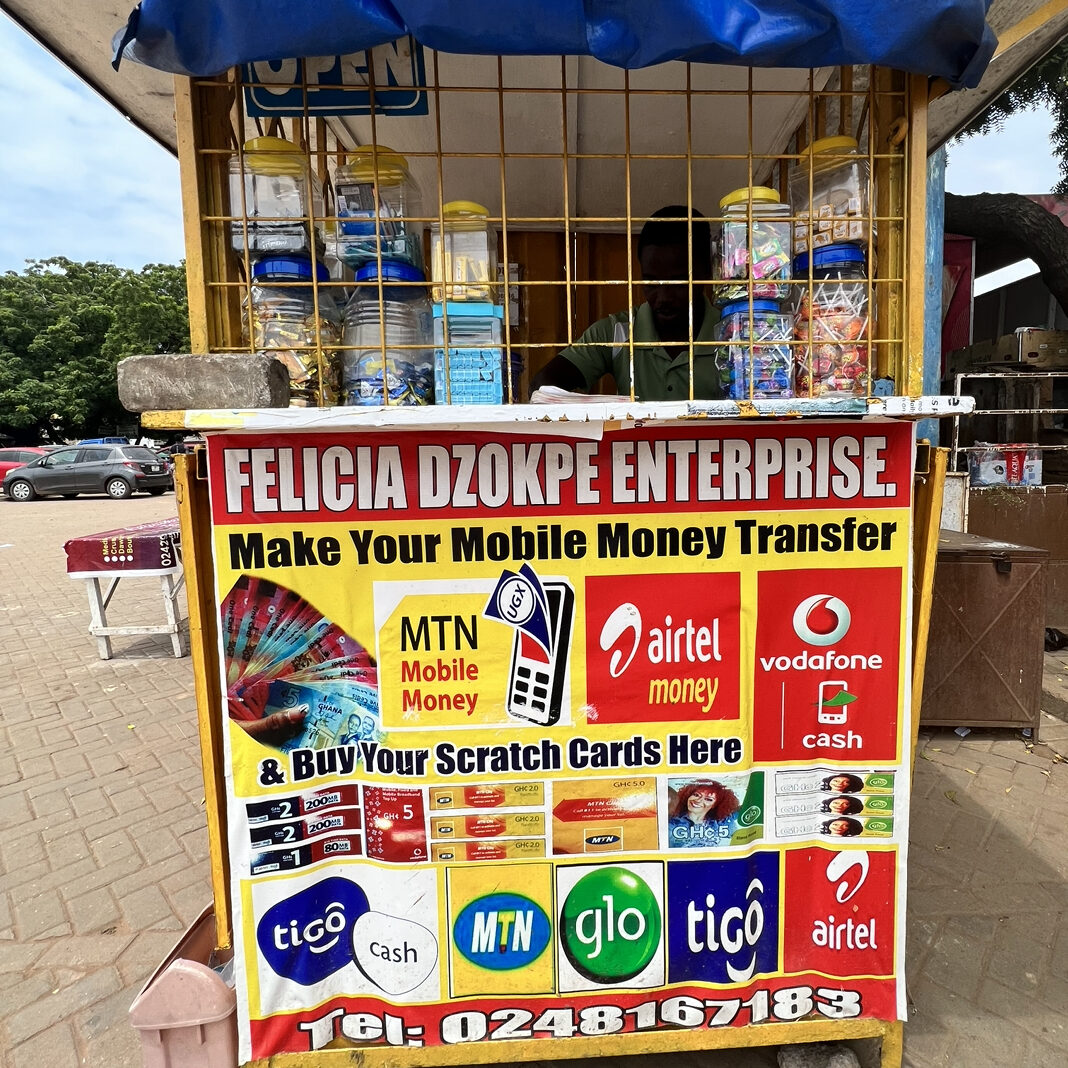
Getting A SIM Card
If your phone is unlocked, getting a SIM card in Ghana is something I recommend getting done on your first day in Ghana. A SIM card will give you a Ghanaian number that you can use to make phone calls and have data to stay connected while roaming around. Ghana is a very “speak to people to get things done” type of country, and you will constantly find yourself in communication with people. You will need to contact your drivers, call restaurants, give instructions to delivery drivers, and more. Having data is great for ordering rides, using Google to research, and receiving text messages as needed.
I got my SIM card from Vodafone, but some other common phone companies in Ghana are Airtel Tigo and MTN. You can walk into any phone company, tell them you need a SIM card, and they will register you for one. Don’t forget to bring your passport as it is required to register a SIM card.
When I last visited Accra in November 2024, I was pleasantly surprised to see representatives from Vodafone at the airport selling SIM cards and phone data on the spot! I purchased a SIM card for about 20 cedes and 200 cedes worth of data.
The registration process was fairly quick and was 1000x more convenient than having to go inside of a physical store, which I was dreading upon arrival. So look out for this service! The two ladies were just walking around with a Vodafone shirt on and a sign casually. I was skeptical at first, but my service lasted me the entire week and was a great time.
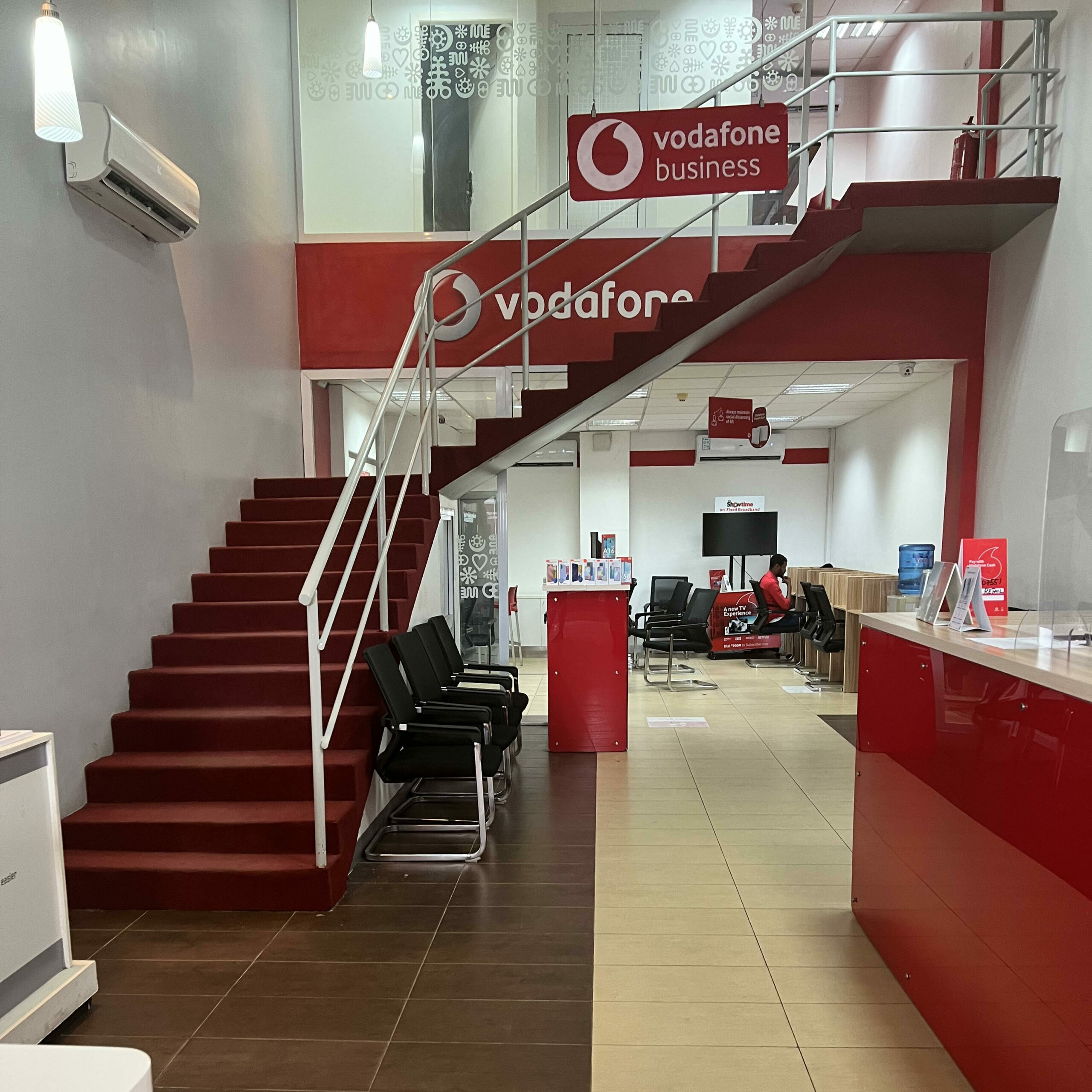
WiFi in Ghana
Ghana is known for many great things, but unfortunately, WiFi is not one of them. WiFi in Ghana can be a hit or miss depending on your city’s neighborhood and your WiFi provider. For example, MTN and Vodafone are popular WiFi suppliers. However, you may be in an area where MTN works perfectly, and Vodafone does not work at all, or the signal is very faint. As you can see, for this reason, WiFi can be a gamble dependent on factors that are really out of your control.
Expect slow WiFi unless you stay at a hotel or signal-boosting location. If you need to do work and your accommodation does not have reliable WiFi, it is best to go to a cafe like Vida E Caffe and use the WiFi there. While it is possible to get work done while here, I would not come to Ghana with a lot of remote meetings to attend. Platforms like Zoom tend to lag, often disconnect during calls, and can overall be risky when you are in Ghana!
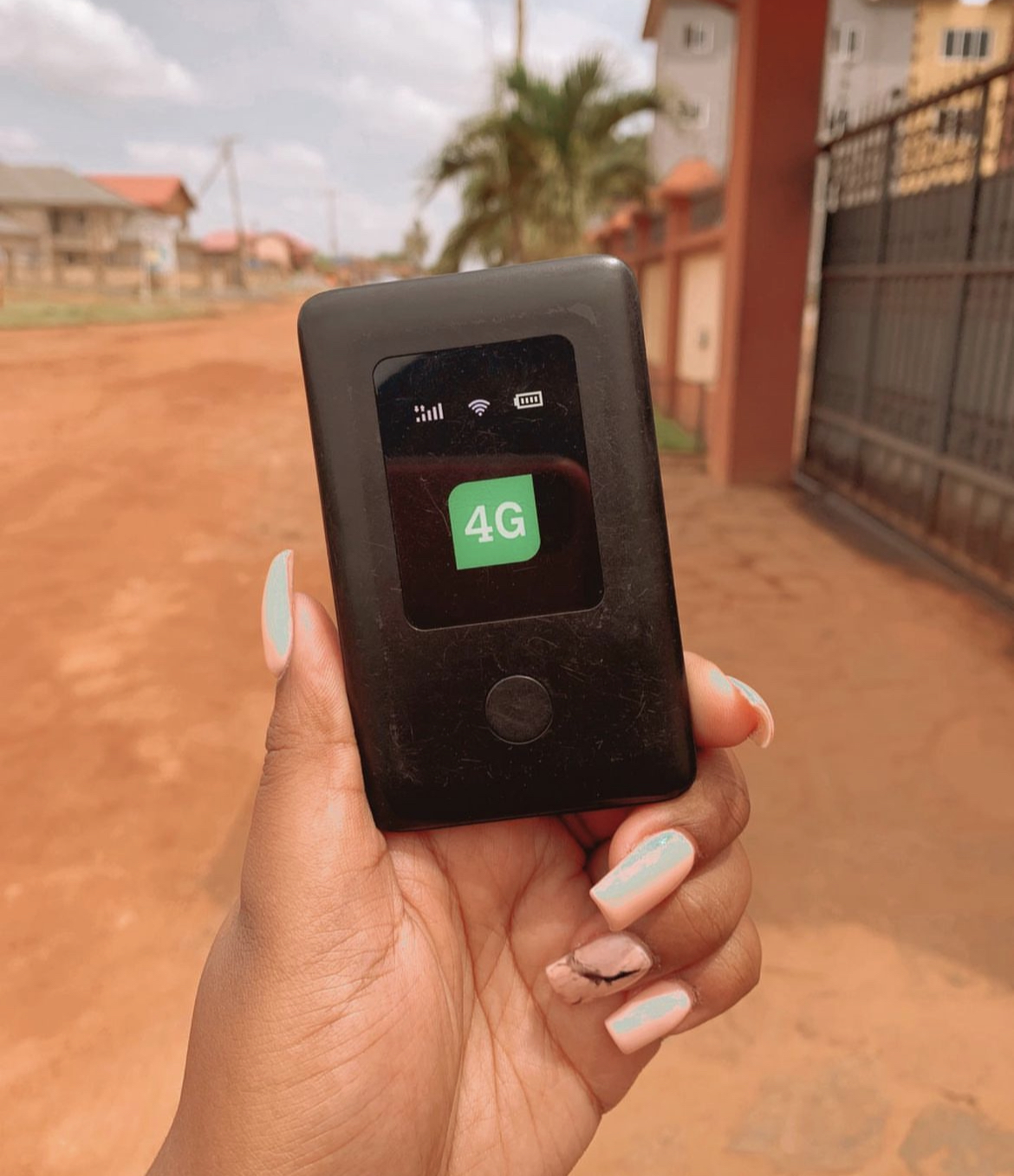
Is Ghana A Safe Country?
What makes Ghana such a desirable country to visit is its reputation for being one of the safest countries to travel to–even alone–in Africa. While Ghana is generally safe, crime does happen and this section of the Ghana travel guide will help you know what to look out for while visiting Ghana.
Petty Theft in Ghana
Petty theft is the number one crime you will have to look out for as a visitor, especially in crowded areas like marketplaces. Pickpocketing is highly expected in the capital, Accra, and some people will steal from you if they get a chance. Like in any other major city, always be aware of your bag placement. Make sure it is zipped up and in front of you while walking.
If you are walking with your phone in your hand, keep a firm grip on it. Also, never stick your phone out of the window of a car or other moving transportation. Motorcyclists and their riders are known to snatch phones from hands and speed away before you can catch them! If a stranger asks you to give them your phone to make a phone call, only let them use it if you are in a controlled environment where they would not be likely to run away with it.
Brutal crimes like gun violence and murder DO happen in Ghana (typically outside of Accra, from what I have read in the local news). As an expat, it is shocking to read these reports because physical safety in Ghana feels so secure that crimes like murder in the country can be unimaginable. However, it puts into perspective that anything can happen anywhere, so never let your guard down.
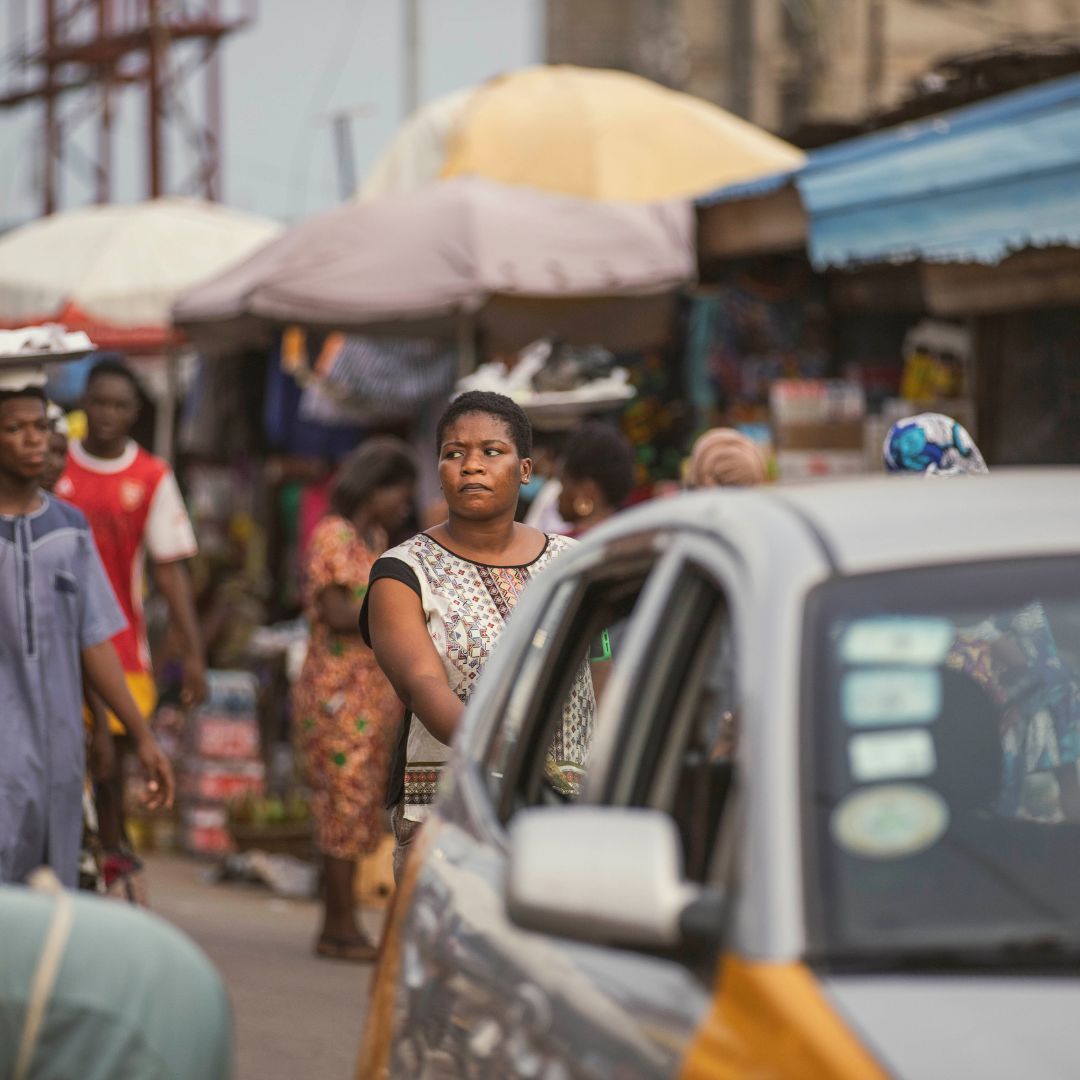
Safety Tips for Visiting Ghana
- Try always to have the windows down when you are in Ubers and Taxis in case you need to leave one abruptly.
- Always keep your bag in front of you when walking in public and crowded areas.
- Accra is a hustling city, and you should be aware of your surroundings at all times. Once you leave Accra, you can let your guard down a bit but still always be aware.
- Register for the STEP and similar programs your country offers before traveling to Ghana. These programs notify you of any protests, safety status updates, evacuations, or any other major events happening in Ghana.
Last Thoughts on Safety in Ghana
Now that you know what you should be aware of about crime in Ghana, I want to reiterate how safe Ghana can be. I have never had any crime or safety issues in Ghana, and that is by taking moderate precautions. Although it can happen anytime, one thing that draws me to Ghana is the lack of brutal crimes. Coming from the U.S., where gun violence runs rampant, it feels great to enjoy life every day without worrying if my life will end in the blink of an eye due to senseless violence. On a visit to Ghana, the biggest thing you’ll have to worry about is your phone not getting stolen in passing, and that is a relief.
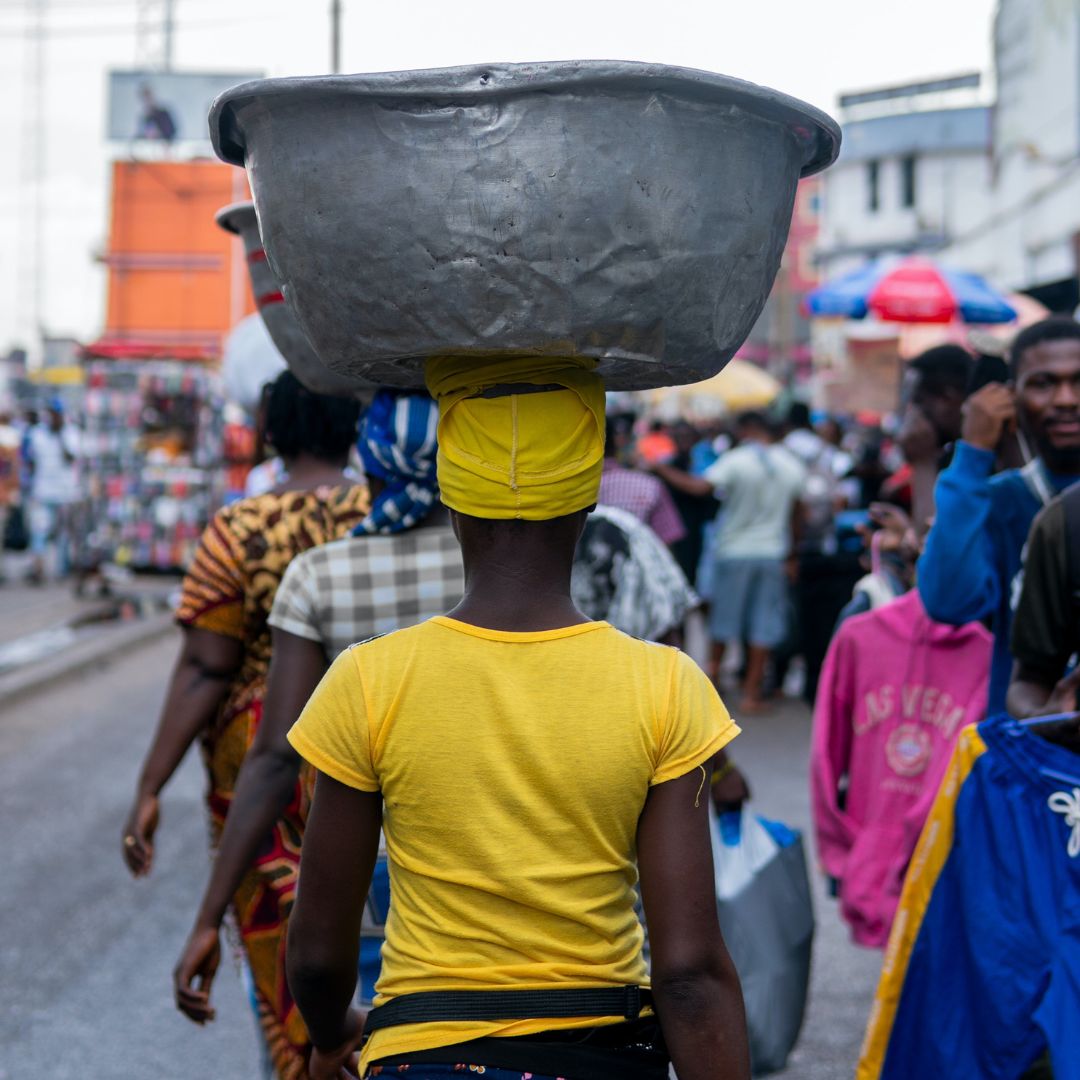
Laws and Customs You Should Know About in Ghana
As in every new land you visit, you should make yourself familiar with the local rules and regulations that would not be common knowledge. There are some laws and customs to know before visiting Ghana that will help your transition into the culture:
Laws and Rules to Follow in Ghana
- Wearing camouflaged clothing in Ghana or any military style clothing is not allowed.
- Marijuana is not legal in Ghana.
Customs + Etiquette
- Use your right hand to give items like money to people, receive items, and eat. In Ghanaian culture, your left hand is considered dirty because it is taught that it is the hand used to go to the toilet.
- Greetings in Ghana are a big deal, and it’s considered rude not to greet others. When you enter a room, you should say hello, good morning, good afternoon, or good evening. When you meet a group of adults and greet them with a handshake, start with the person on the farthest right.
- Respect for elders is immense in Ghana. You should not greet elders with a hat on your head. If you are wearing a hat, take it off completely or lift it halfway while extending your greeting. Give up your seat on the bus for those older than you.
- Crossing your legs and having your hands in your pockets in the presence of elders are gestures that are frowned upon.
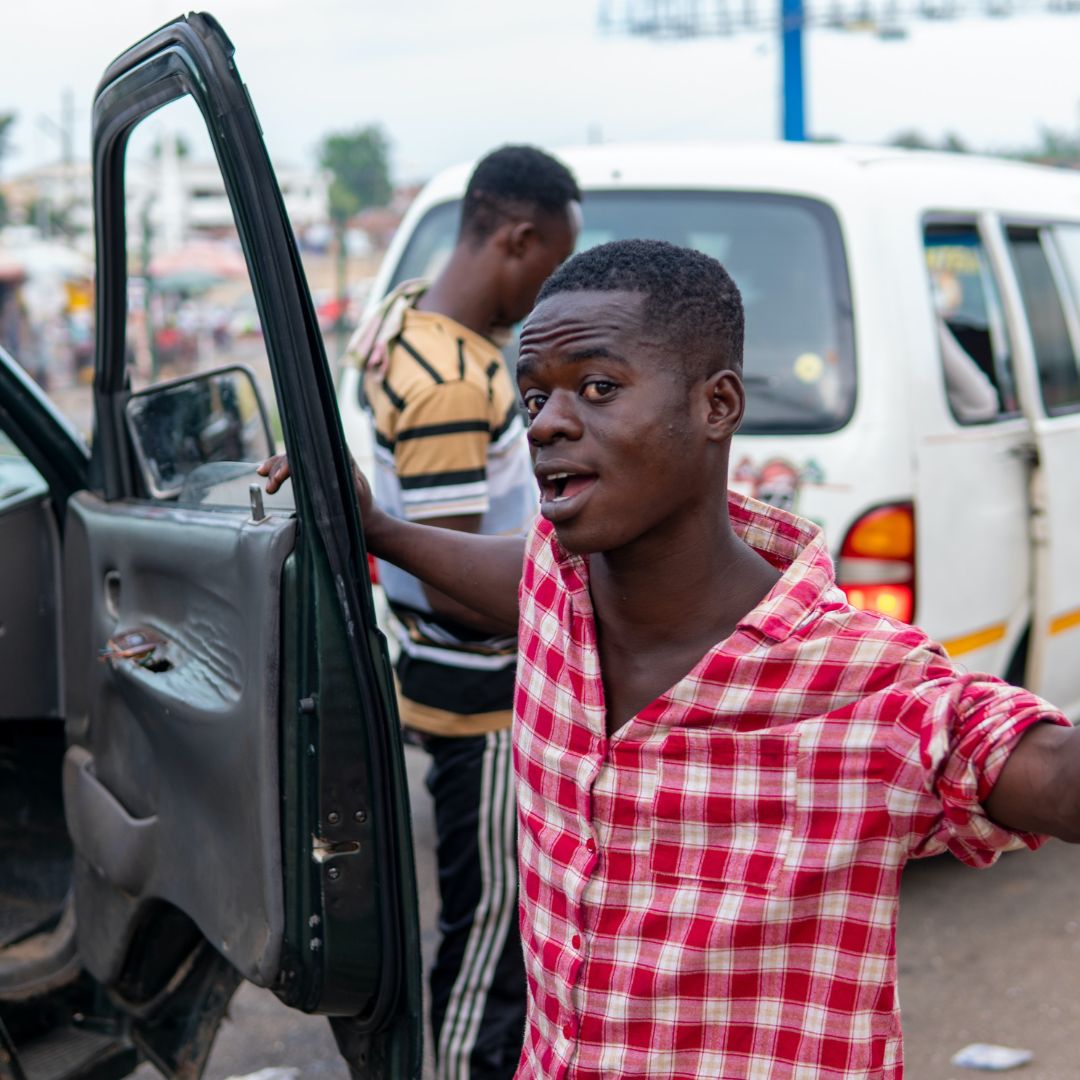
Is Ghana LGBTQIA+ Friendly?
Ghana in general is not an LGBTQ+ friendly country. Many Ghanaians look down on the LGBTQIA+ community. In some areas in Ghana, openly LGBTQIA+ individuals can be targeted and are victims of cruel violence. Members of the community are frequently subject to discrimination by police, family members, and society.
In 2021 an anti-LGBTQ+ Bill, formally called the Promotion of Proper Human Sexual Rights and Ghanaian Family Values Bill 2021, was introduced that criminalizes same-sex relationships, advocacy for the LGBTQ+ community, cross-dressing, and other restrictions on the community.
If you are a member of the LGBTQ+ community, I recommend being extremely careful when traveling to Ghana, especially as a same-sex couple. It is not recommended to outwardly display acts of affection towards a member of the same sex in this country. Many people claim to not mind it, but are also very vocal about not supporting it and feel that it is something that should not be practiced in public.
With all of that being said, I have found that what is usually being talked about on the surface is not the reality “underground”. There are many Ghanaians who identify as part of the community and many who are not, yet who I have found to be accepting. Many are not “loud” about being queer, but there are spaces once you find those who are part of the community.
Local Terms to Know
Akwaaba – “Welcome” in Twi! You may see these words spread across the entrances of some places or be greeted with these words upon arrival.
Ɛte sɛn? (eh-te-sehn) – “How are you?” in Twi
Ɛyɛ (eh-yeh) – “I’m fine” in Twi as a response
Chale – While it may sound like “Charlie”, chale means friend and is used commonly in dialogue. You will likely get called chale at some point during your time in Ghana.
Medaase – Thank you.
Chop – To eat. You may hear people refer to local eateries as “chop bars” meaning places to eat.
Abeg – In broken English/pidgin, it simply means please or to please.
I’m coming – In Ghana this phrase means “wait a moment”. It may be used when someone is taking their time to do something like give you change for your purchase.
Obroni – A white person, but sometimes used to describe foreigners in general.
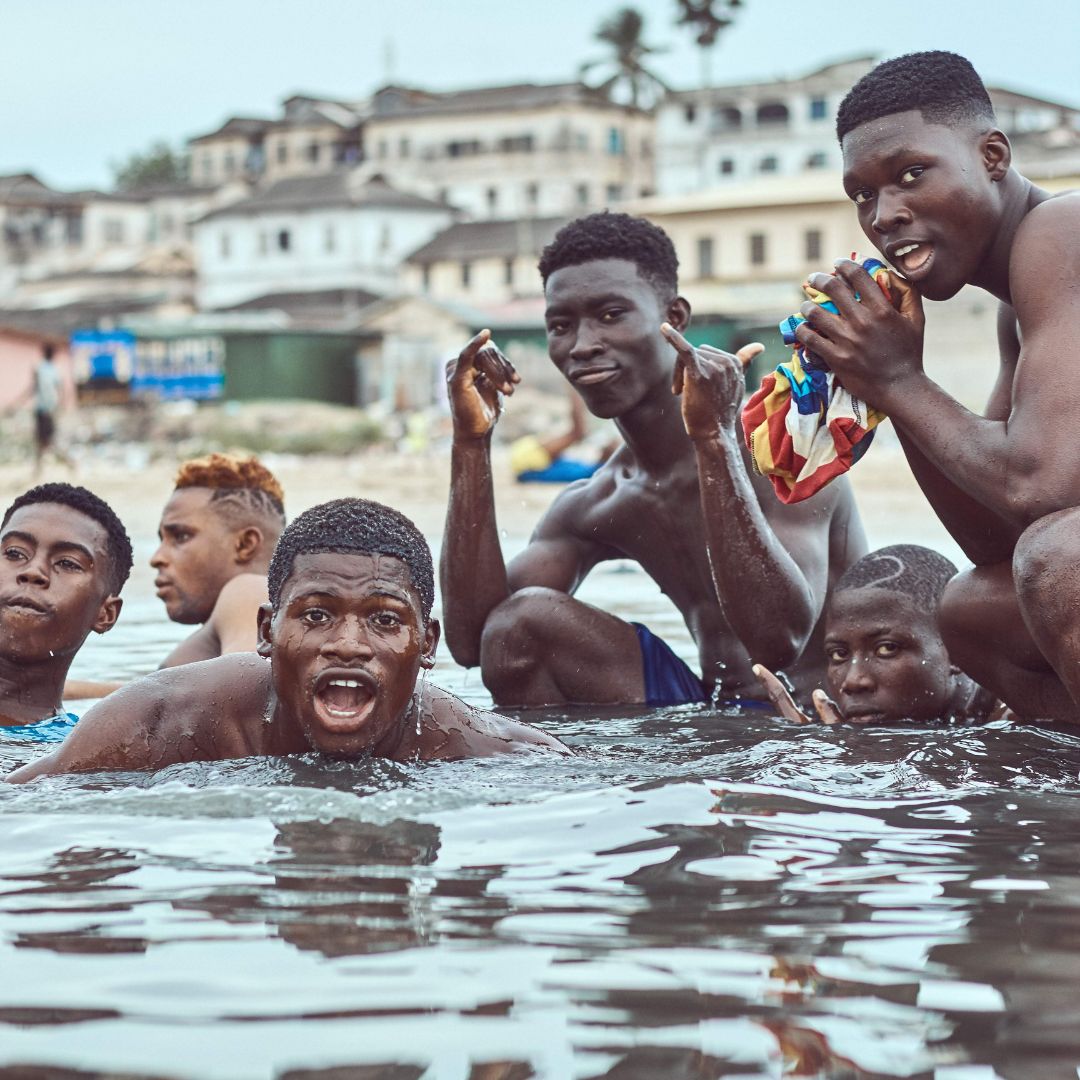
What is COVID Like in Ghana?
Although COVID has severly died down around the world, I want to keep this section in the blog post just in case.
COVID in Ghana is very relaxed compared to many other countries. According to the World Health Organization, since January 2020, Ghana has had only 1,456 deaths from the virus. In 2020 and the beginning of 2021, many of Ghana’s annual festivals and celebrations like Afrochella (Now known as AfroFuture) and the Chale Wote Street Art Festival were halted due to the pandemic but began to get back to normal towards the end of 2021 and coming into 2022.
Many citizens have never even believed that the virus was real till this day and have ignored precautions. However, at the height of the pandemic, the wearing of masks was enforced in many establishments. Social distancing is never enforced in Ghana due to the close proximity that people usually find themselves in, like on public transportation.
In March 2022, during his 28th national address, Ghanaian President Nana Akufo-Addo addressed the COVID-19 measures the government was taking. In his address, he announced that the wearing of face masks in public settings is no longer required but can be done by choice. Since then, people in Ghana have generally been more relaxed about wearing face coverings, and talk about COVID is little.
Where Can I Get a COVID Test in Ghana?
There are many places where you can get a COVID test in Ghana. Many of these centers are aware of the quick turnaround times needed for those traveling back to their home countries and can meet those deadlines. Here is a short list of places where you can get tested around popular cities in Ghana:
| City in Ghana | Testing Center |
|---|---|
| Accra | LEDing Medical Laboratory – 27 PawPaw Street, East Legon |
| Cape Coast | Cape Coast Metropolitan Hospital – Assin South |
| Kumasi | The Kumasi Centre for Collaborative Research – Asuogya Road |
| Takoradi | Takoradi Veterinary Laboratory |
| Tamale | Tamale Public Health Reference Laboratory |
Some locations require you to schedule a slot to come in for testing, and others allow you to walk in without an appointment. I recommend calling before going to the centers and double check if you can use a card for payment or if you need cash.
Where to Stay in Ghana
Ghana has several accommodation styles that are suitable for every kind of traveler. Whether you are looking to travel to Ghana with luxury or stick to a tight budget, there is accommodation that will fit your needs. This section of the Ghana travel guide will tell you the types of accommodation options available in Ghana and where to look for accommodation options available in Ghana. There are MANY options in Ghana so I’ll list out 3 places for each accommodation option.
What Kind of Accommodations Are Available in Ghana?
There are many different types of accommodations in Ghana. I’m going to mention three well-known hotels under each of the sections that are more budget hotels.
Note: Please understand that this does not even come close to the type of options available in Ghana and that you will want to do additional research beyond these as there are so many options!
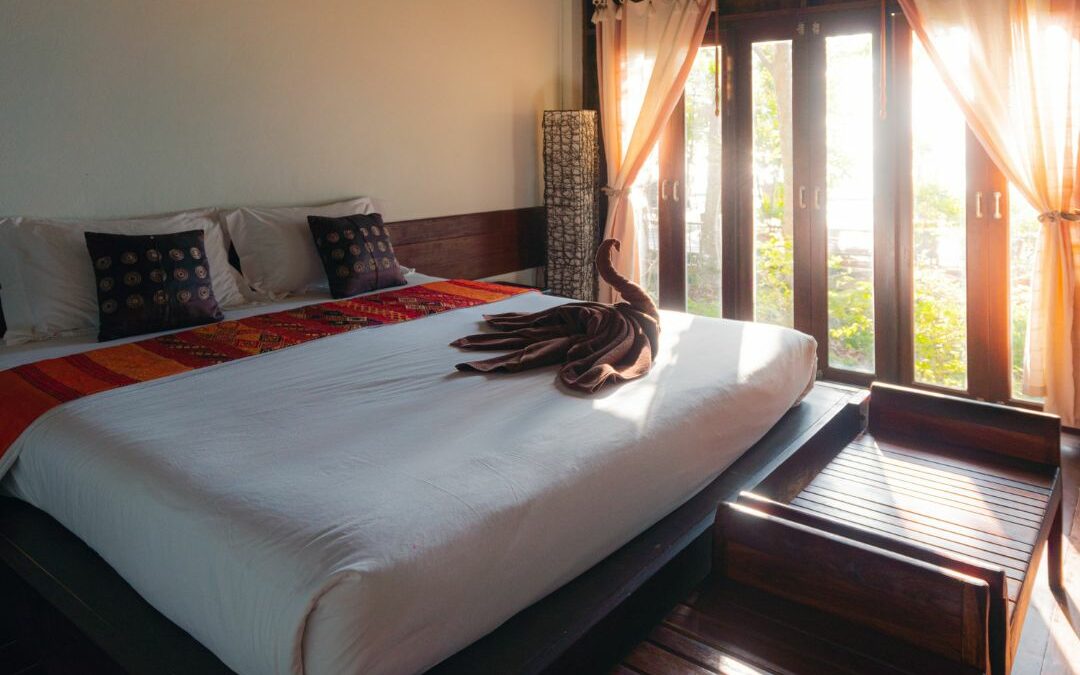
Hotels in Ghana
There are several hotels in Ghana scattered around most cities. Budget hotels can be as low as $30/night, while hotels on the higher end of the scale can get up to $200+/night.
- AH Hotel – Accra, Ghana
- Jeyads Lodge – Tamale, Ghana
- Ridge Royal Hotel – Cape Coast, Ghana
Hostels in Ghana
If you are looking for a more affordable option, consider staying at a hostel in Ghana. There are stand-alone hostels and hostels apart from universities that rent out rooms to guests.
- Somewhere Nice – Accra, Ghana
- TUMI Hostel – Kumasi, Ghana
- Belgha Bar and Hostel – Tamale, Ghana
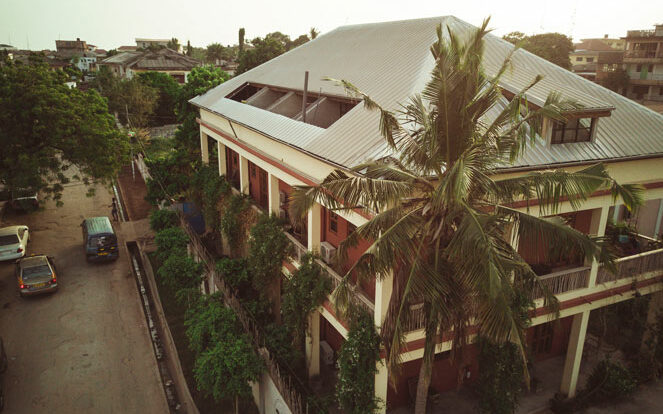
Airbnbs in Ghana
Airbnbs are a popular option in Ghana because they are cheaper than hotels and provide much more flexibility date-wise. You can find some great stay options in Ghana through Airbnb, so I highly recommend looking through the listings. These airbnbs will be for Accra:
Booking.com
Booking.com is also a great resource for checking out hotels in different cities in Ghana. Outside of Accra, it can be challenging to see what hotels are available through a simple Google search, making Booking.com very helpful.
How to Get Around: Transportation in Ghana
Uber/Bolt in Ghana
Uber and Bolt are the most common apps for hailing rideshare in Ghana. While Uber is considered to be an expensive mode of transportation in other countries, in Ghana, most people use them to get from Point A to B. An average 5-15 minute ride with Uber or Bolt can range from ₵6-15 ($0.75 -$1.88). On the pricier end, a 30+ minute ride will be $8-$15. In cities like Accra, where the traffic is heavy, the fares will rise but will never be outrageous as traffic is often factored into fares. Uber and Bolt are the most efficient way to get around because a ride can be requested on demand.
I recommend downloading both apps to compare prices and pick the platform that offers the best fare for that particular journey. Bolt is generally cheaper, but Uber sometimes wins that battle, so always check both to save some coins!
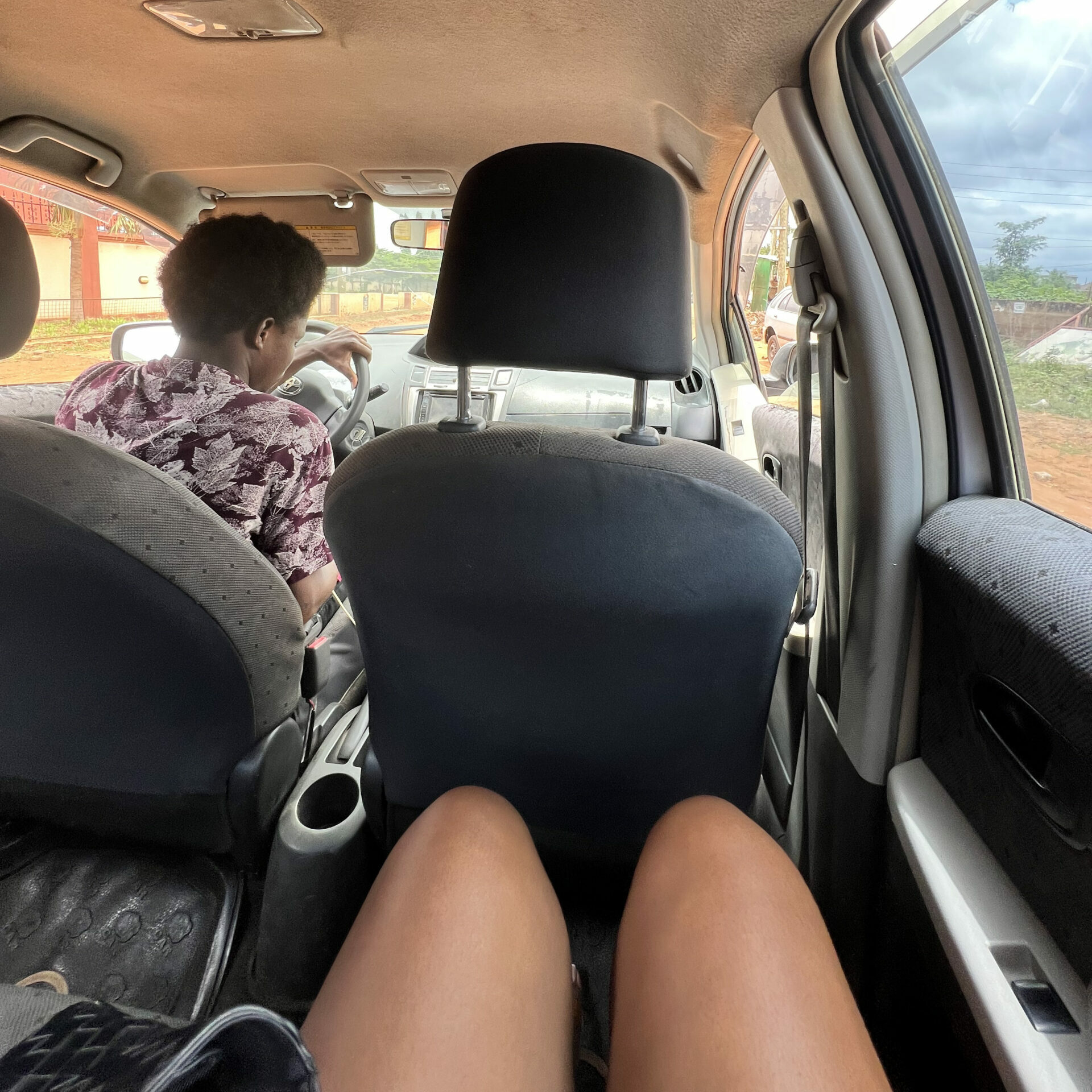
Uber and Bolt drivers prefer cash, so be sure to carry enough cedis to pay for your ride. If you try to pay with a card via the app, you may notice that your ride keeps getting canceled as drivers will keep declining your request for a ride if it is a car trip.
Bolt operates in Accra, Cape Coast, Kumasi, and Takoradi.
Uber operates in Accra and Kumasi.
Yango in Ghana
Yango is another rideshare app used in Ghana that is similar to Uber and Bolt, but less used. The fares are usually significantly less than Uber and Bolt so it is worth using. If you download the app and schedule your first ride, use my promo code XOT75J93 for 10 cedis off of your ride!
Taking A Tro Tro in Ghana
Tro-tros are small minivans or buses that can be found in most cities in Ghana. Tro tros mimic hop-on-hop-off public buses, stopping regularly along the way for passengers to board and offboard at stops around their cities. Tro tros are the cheapest and most local way to get around in Ghana. Rates vary depending on the route – a 30-minute ride will cost about ₵3.50 (US$0.44).
I wrote a blog post on how to take a tro tro with more details!
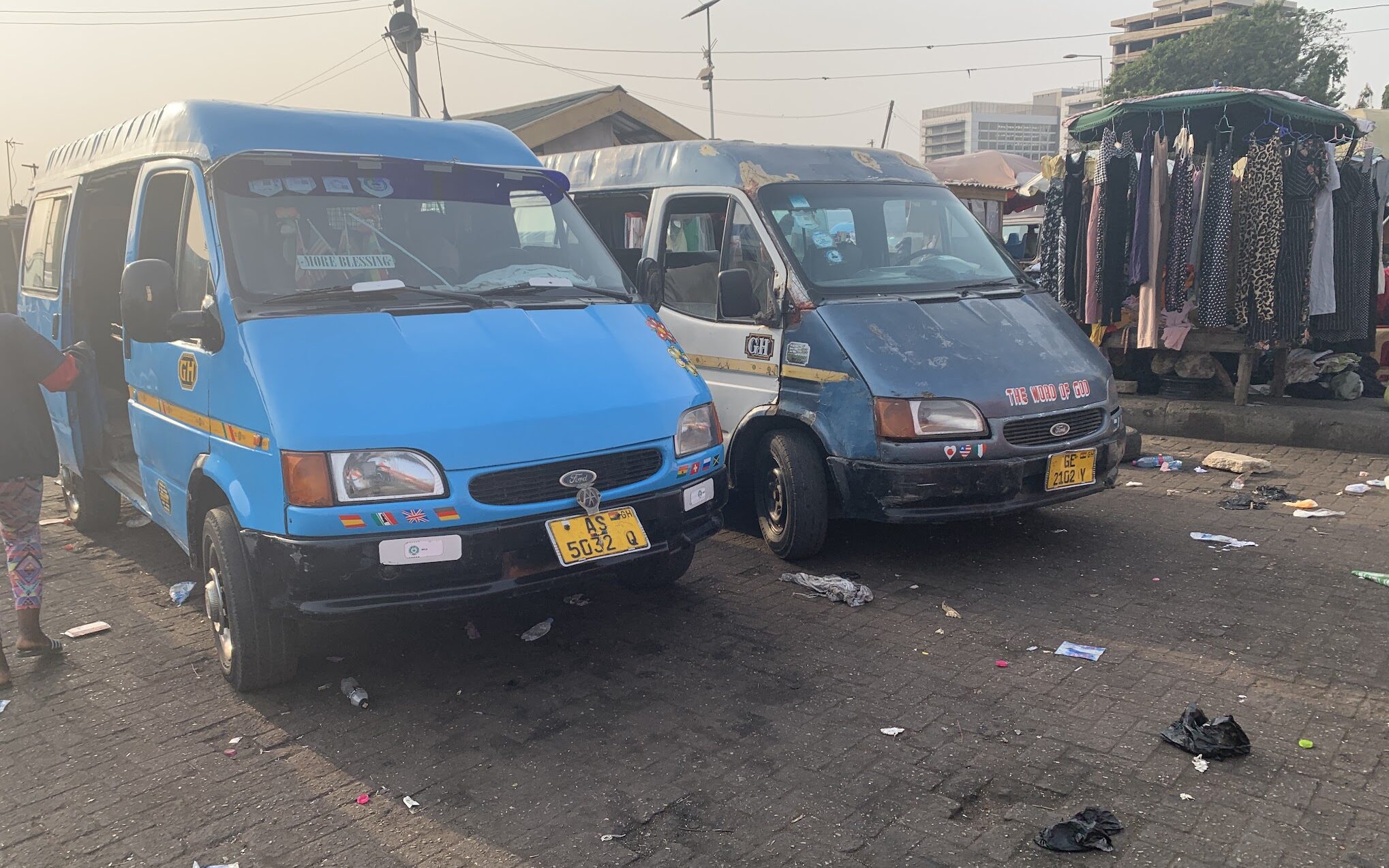
To flag down a tro-tro in passing, raise your index finger to indicate that you want to get on and tell the mate your desired destination so he can let you know when it’s time to get off. You can also use Google Maps to see if the tro tro is headed towards your desired destination. Carry small bills on you – fares are low, and the mate may not have change for larger bills. Remember that tro tros constantly stop, which can significantly add to journey times. The lengthy rides are why although tro tros are cheap, they are not the most desired mode of transportation. They are also usually packed and don’t typically have air conditioning.
Taxi
Ordinary taxis can be found all around Ghana and are also the most expensive way to get around. Taxis are not metered, so you’ll have to bargain for a fare. Tell the taxi driver where you want to go, the driver will name their price, and you can either accept it or try to bargain for a lower fare. Taxis are generally safe to use in Ghana, but many people prefer to use Uber or Bolt because the app shows a map of the trip as it is happening, and you can share your location in real-time with trusted contacts. It’s a good habit to check the fare on Uber or Bolt as a point of reference for how much you should be paying for a regular cab. However, because taxi drivers set their own rates, the fare will almost always be higher than for rideshare.
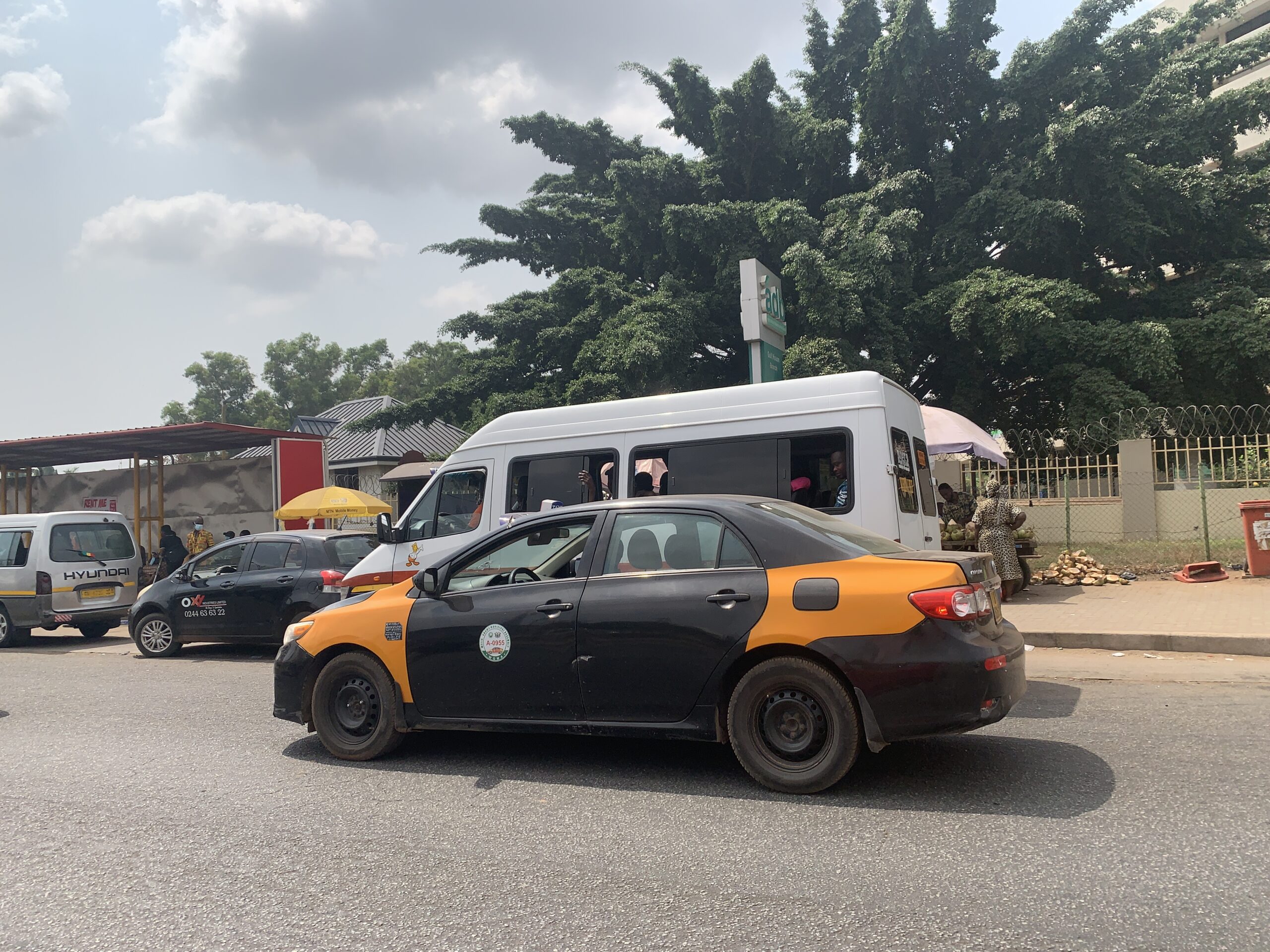
Motorcyles
Motorcycles are heavily used in Ghana but are more common in certain cities than others. Locals usually have their own motorcycles and use them to give rides. In busy areas such as markets, you’ll spot groups of local motorcyclists waiting around for business; tell the driver where you want to go, bargain for a fare, and you’ll be on your way. Motorcycles are not the safest options in cities like Accra but are common up north in Tamale.
In Tamale, driving conditions are less hectic, and riding motorcycles are safer. I recommend scouting the driving conditions of the city you’re in to decide whether you feel safe riding one.
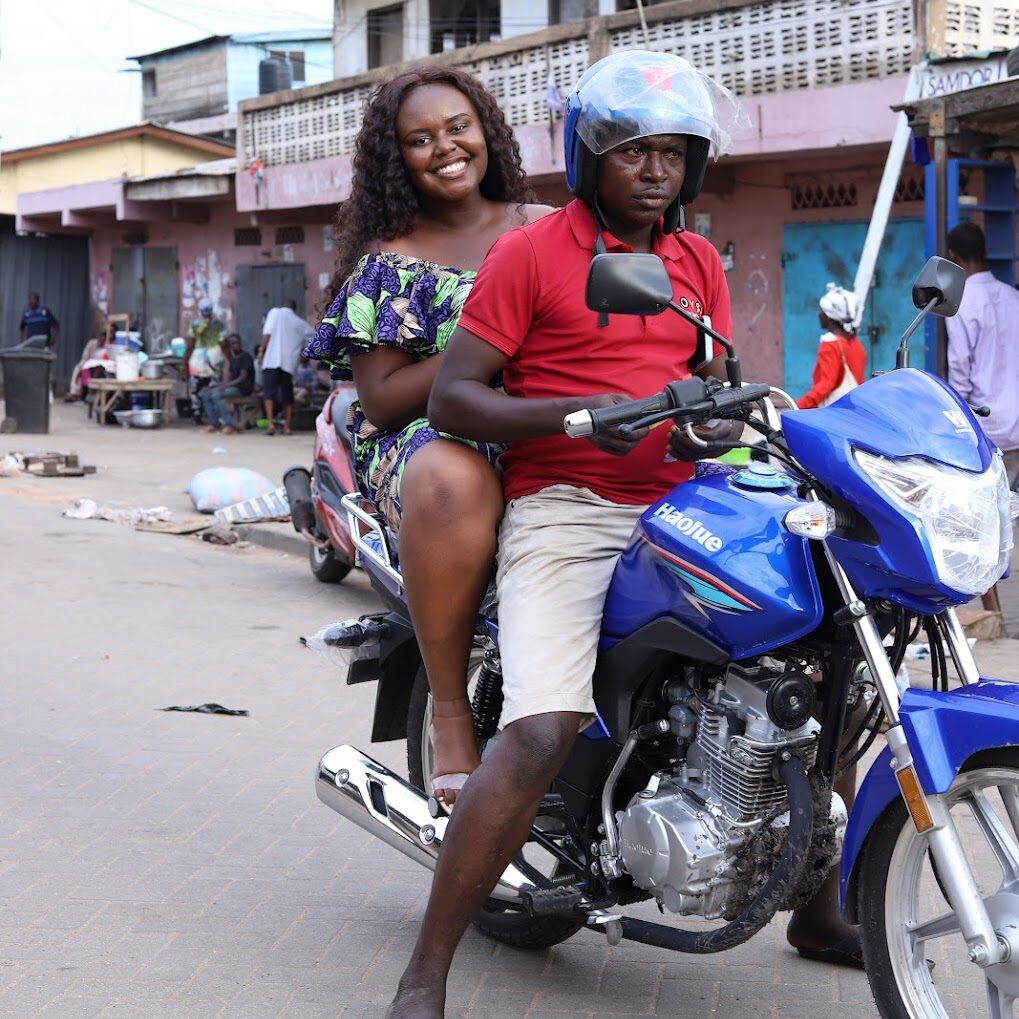
Tuk tuk
Tuk tuks can be found in some Ghanaian cities like Tamale and Cape Coast, and these small, three-wheeled moto kart vehicles are a very efficient way to get around. It’s easy to hail a ride –just catch the attention of a passing tuk-tuk driver by waving or raising a finger, and they will pull over, and you can discuss a fare for your journey.
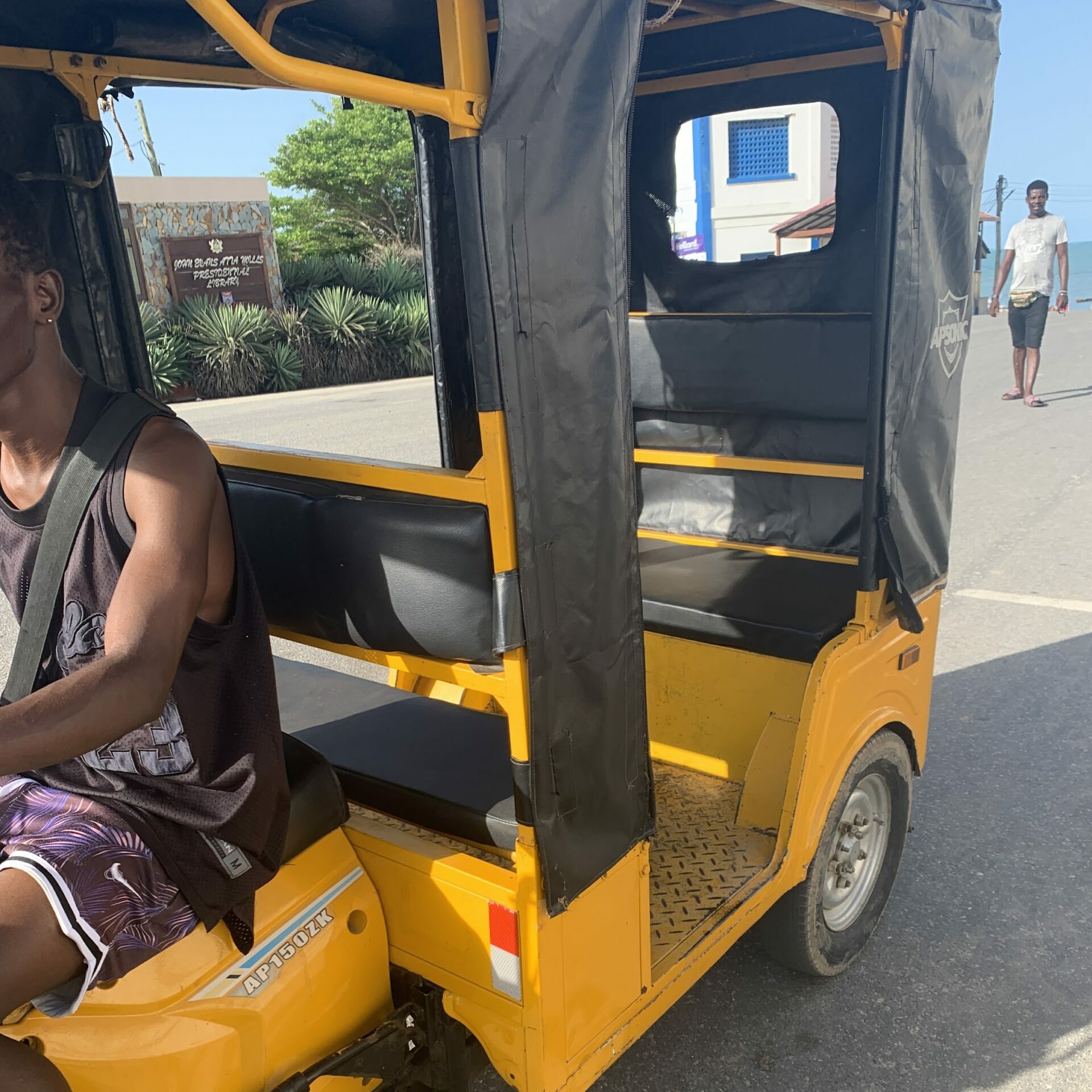
Driving
Renting a car and driving in Ghana yourself is an option if you have an international driver’s permit, in addition to your home license is an option if you are up for the challenge! There are a lot of potholes, and traffic rules are usually not followed, so if you are coming from a country that has strict road regulations, you’ll be in for a treat. You may find driving more stressful than it’s worth versus just ordering an Uber. If you’ve driven in foreign countries before, you should be okay. Many foreigners navigate the streets of Ghana just fine once they get the hang of it!
Walking
Depending on the Ghanaian city, walking in Ghana can be challenging. The rocky nature of roads, dirt paths, and potholes make it possible but challenging to walk long distances, especially if you are not wearing the right attire. Sidewalks are not always available, so you will find yourself sharing the road with speeding cars and even cows at times!
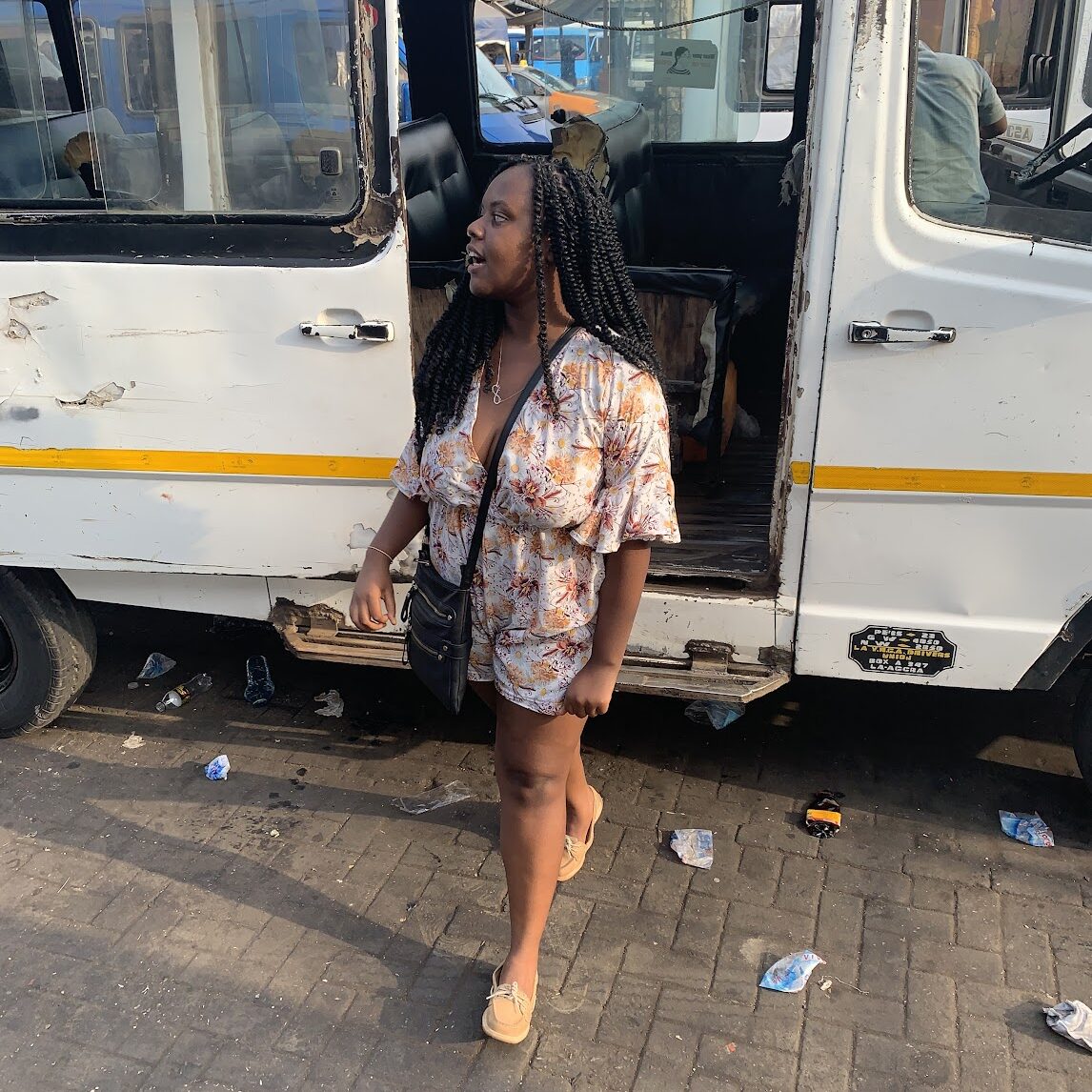
What is the Best Way to Travel to Other Cities in Ghana?
Intercity STC Bus
The STC Bus provides service to and from numerous cities in Ghana for a fare. You can purchase your ticket via the website or at the ticket booth at a station. The buses are a very efficient, clean, and reliable way to travel around Ghana.
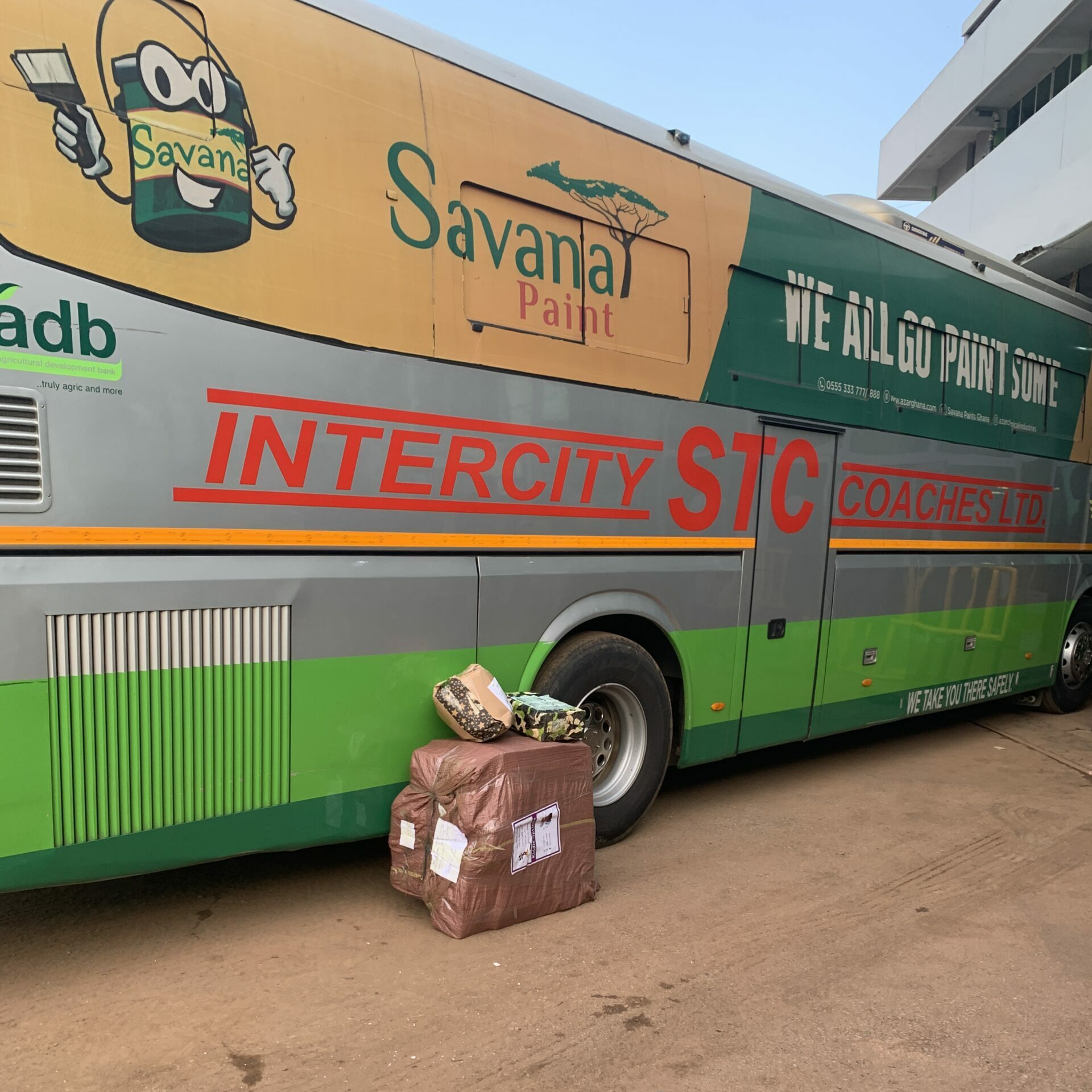
Plane
Passion Air and Africa World Airlines are two domestic flight carriers that offer flights to cities in Ghana from Accra. Both airlines have several flights daily to Takoradi, Tamale, and Kumasi, and Passion Air also offers flights to Wa, Ho, and Sunyani. Tickets can be purchased at the local airport and online. Domestic flights are usually one hour or less and are fairly comfortable.
Food In Ghana
Local Dishes to Try in Ghana
One thing you will do on your trip to Ghana is eat! Ghana has an array of worldwide cuisines offered by restaurants in addition to local dishes that you have to try before heading back home. Common dishes in Ghana are jollof rice and soups paired with a starch like “fufu” or yams.
Find a full list of Local Food Restaurants in Accra here.
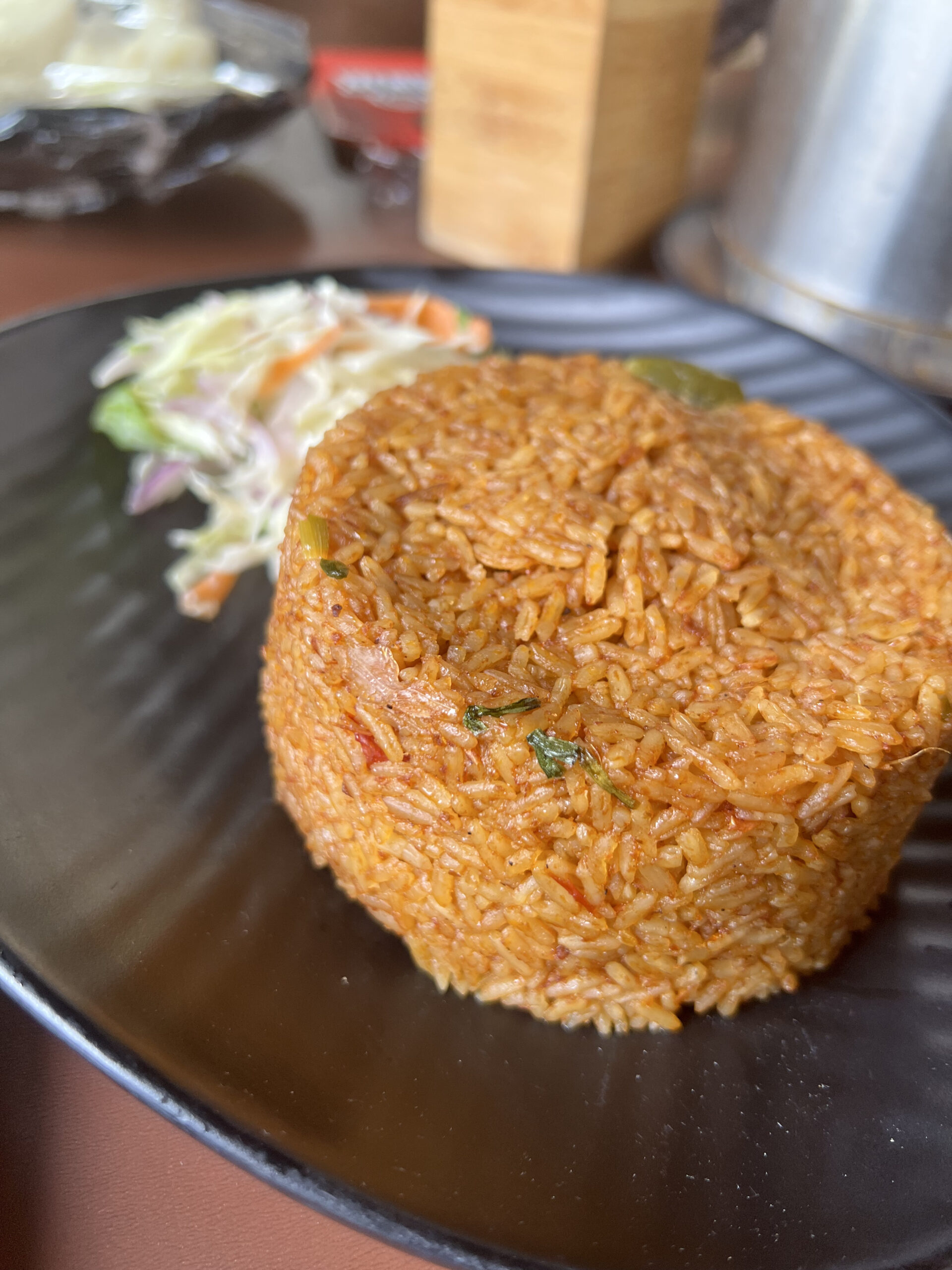
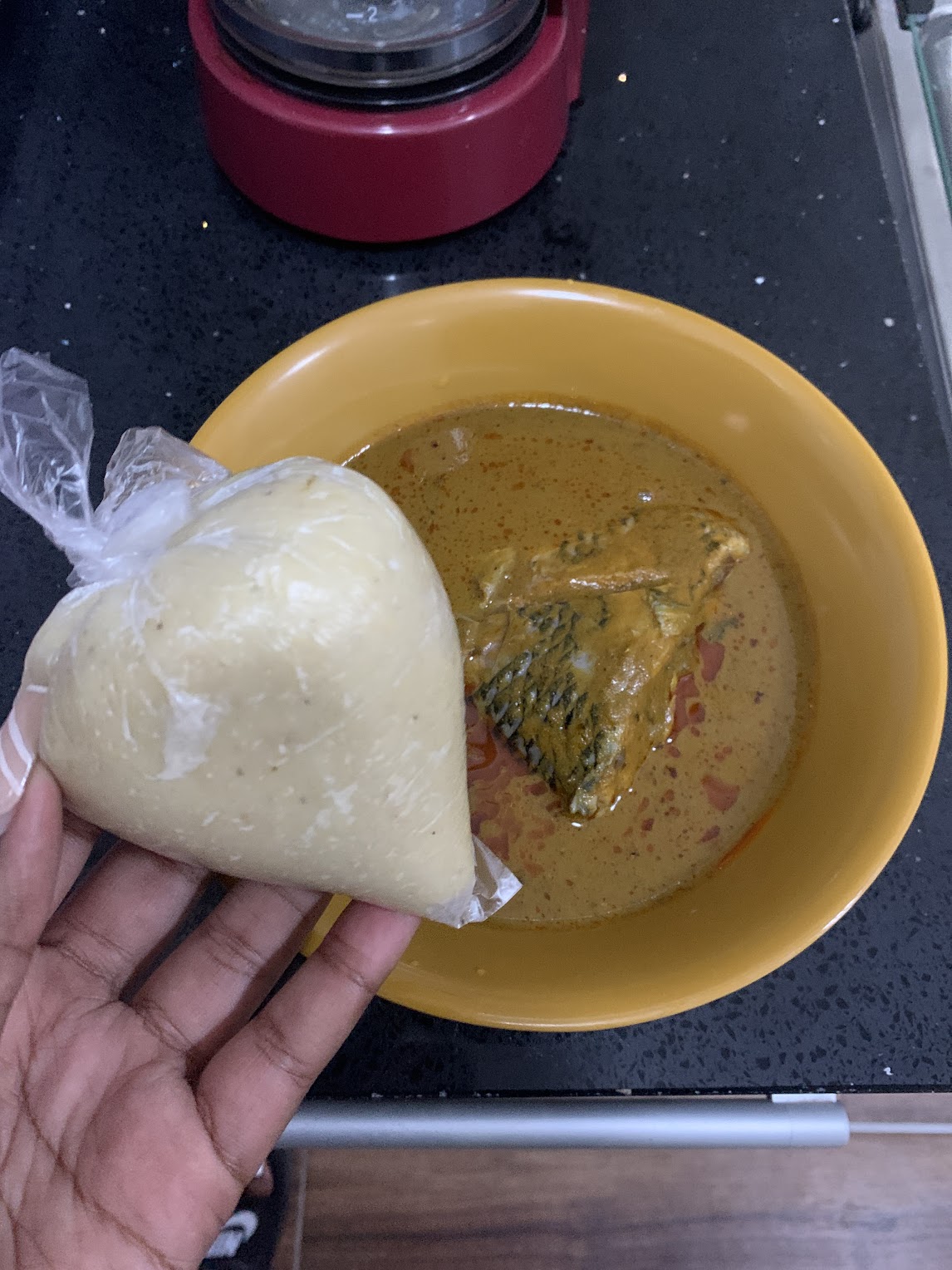
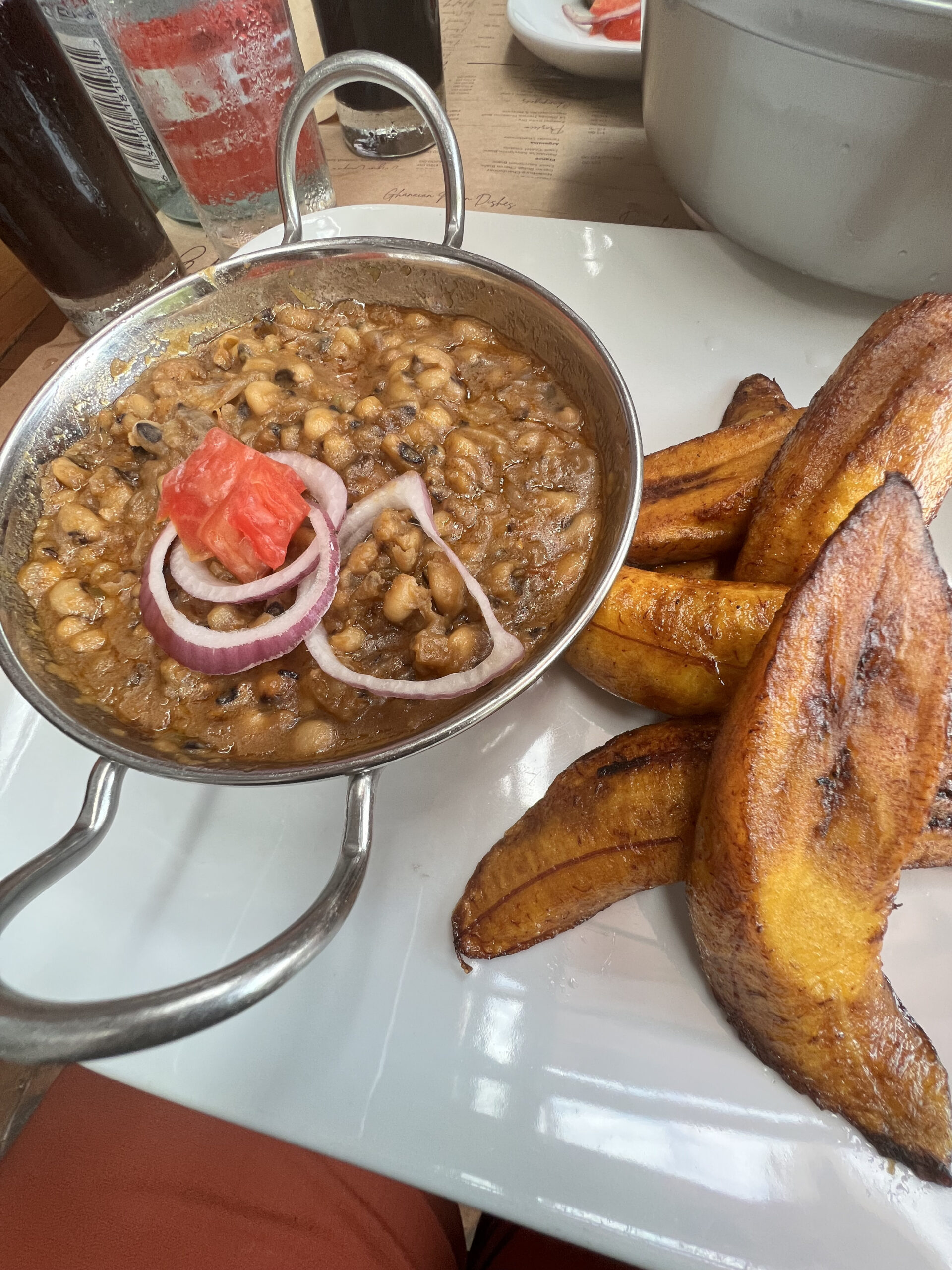
Jollof Rice – This dish is what you probably thought of when you think of food in Ghana! The tomato-based dish is often served plain, with vegetables, or with a side of meat and is always a good decision for a meal.
Groundnut Soup – Made from peanut butter and rich spices, groundnut soup is my personal favorite local dish in Ghana. It is served with fufu, banku, or omotuo (rice balls). I love it with rice balls and salmon!
Waakye – Waakye is a mixture of rice and black-eyed peas. This meal is usually paired with sides like spaghetti, eggs, shito (spicy black sauce), and whatever else is being offered by the vendor.
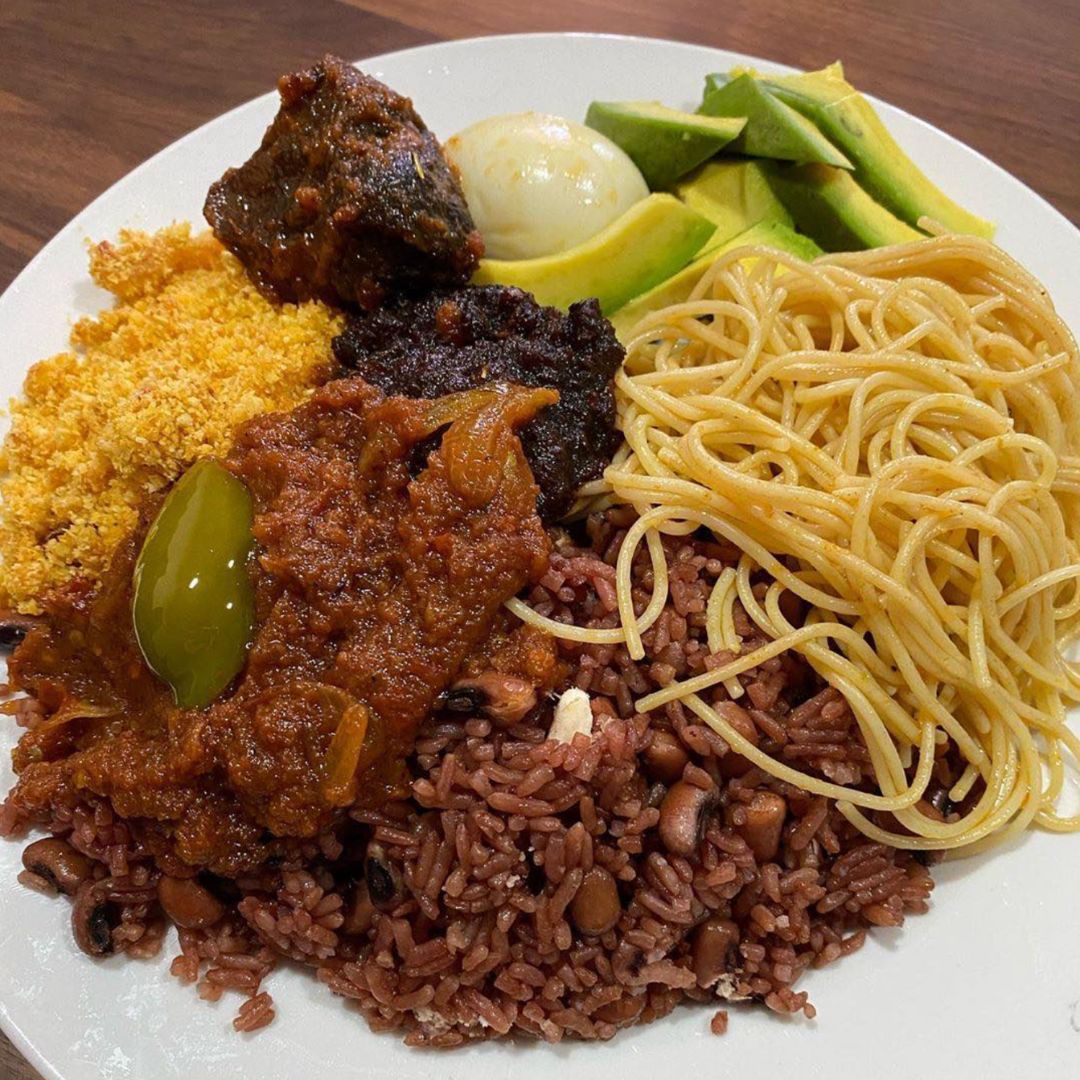
Banku and Tilapia – Banku favors fufu, but is more rough in texture. Cooked from corn dough and cassava dough, banku is eaten with a large piece of tilapia topped with fresh bell peppers and shito sauce.
Red-Red – Best described as black-eyed peas cooked in tomato sauce and served with fried sweet plantains, this dish is a staple in Ghana.
Rice Water – Ghana’s breakfast foods are mainly porridge-based and rice water is my favorite! It is boiled rice water (cooked until soft) with milk, and sugar served with bread.
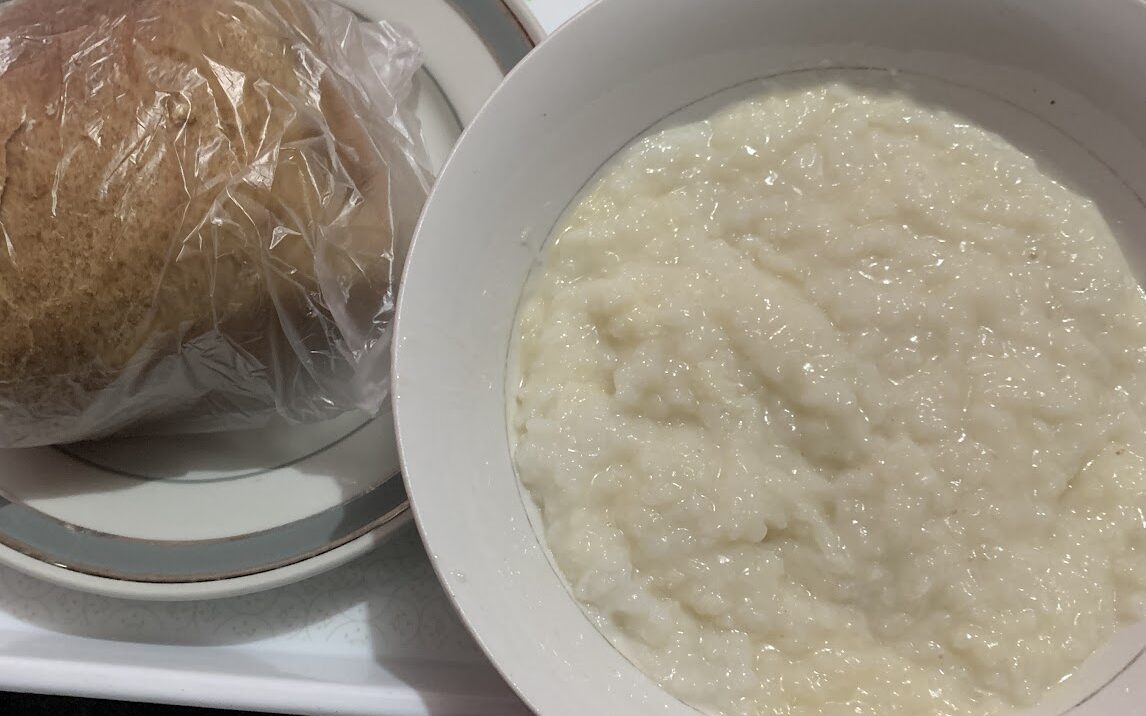
Plain Rice and Stew – White plain rice served with a tomato stew and meat of choice.
Some Restaurants to Visit in Accra
Accra has an incredibly lively food scene that foodies tend to love when visiting Ghana. In this section I’m going to share a few restaurants I would visit in Accra with more available in a separate blog post:
Find a full list of 18 Restaurants to Try in Accra here.
Oseikrom Aduanipa – A 24-hour restaurant serving traditional Ghanaian foods at a cafeteria-style eatery.
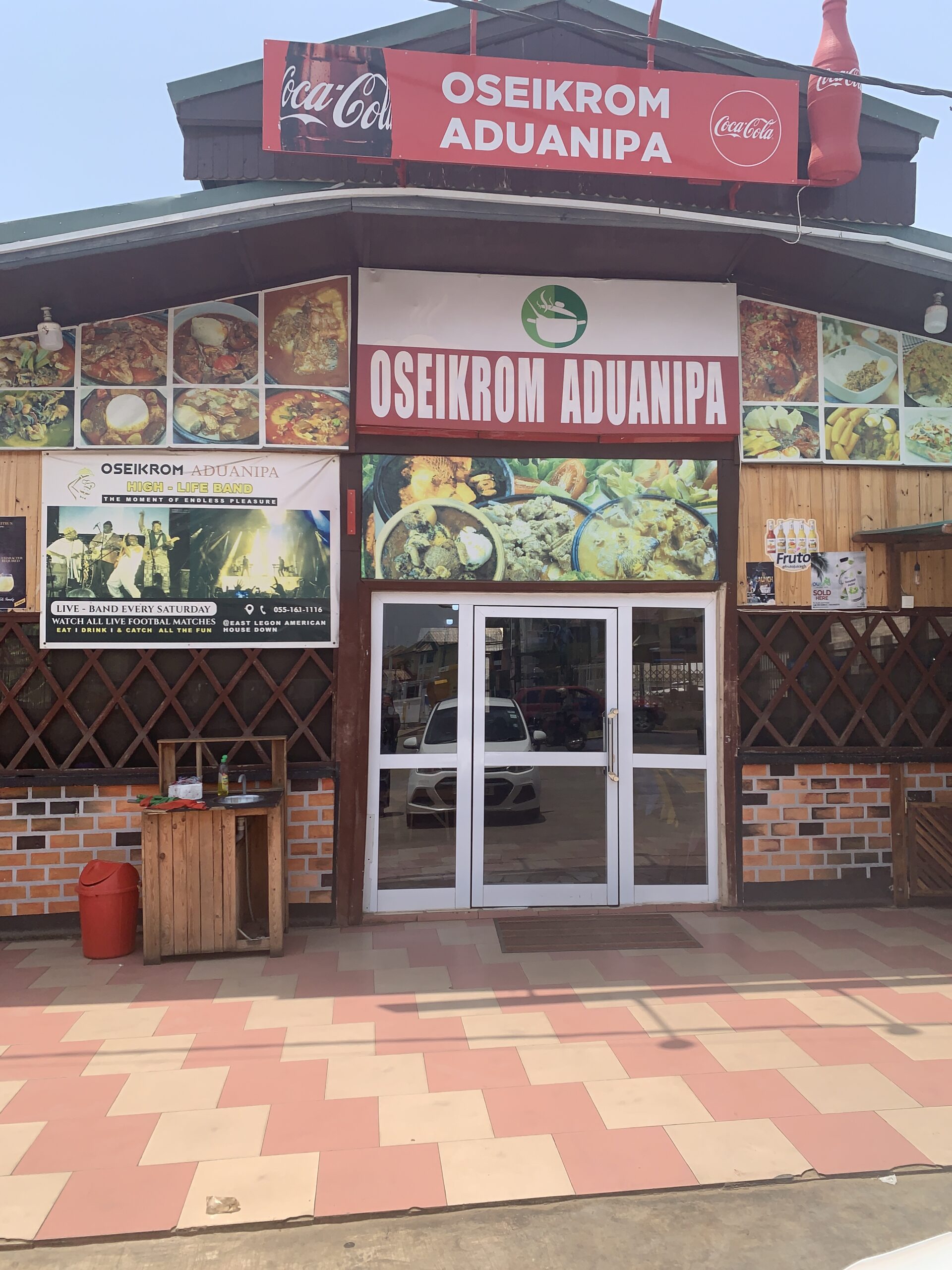
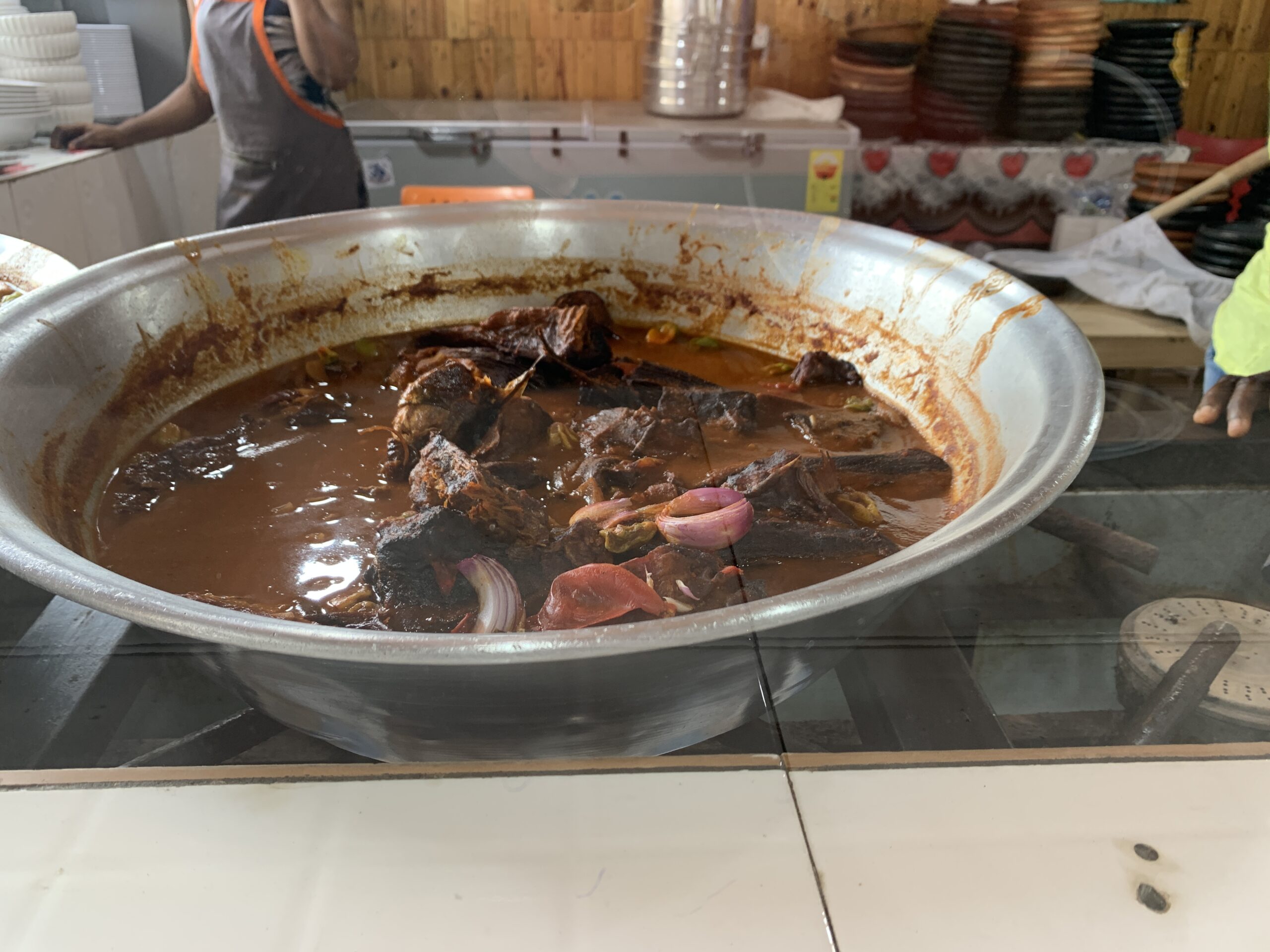
Tatale – A vegan restaurant in Osu, Tatale replicates local dishes in Ghana but places a vegan spin on them. They have a great menu, and the owners have amazing energy!
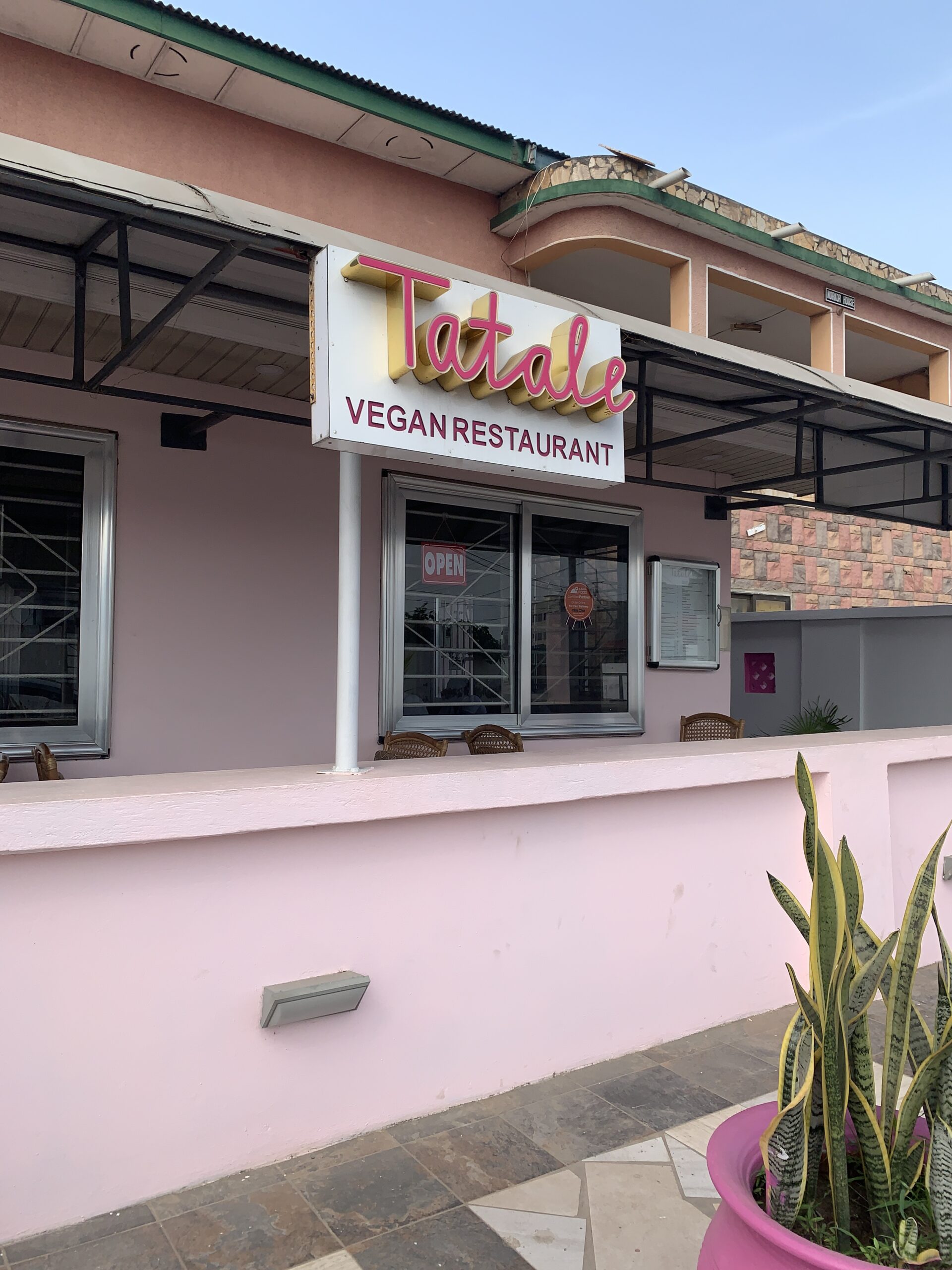
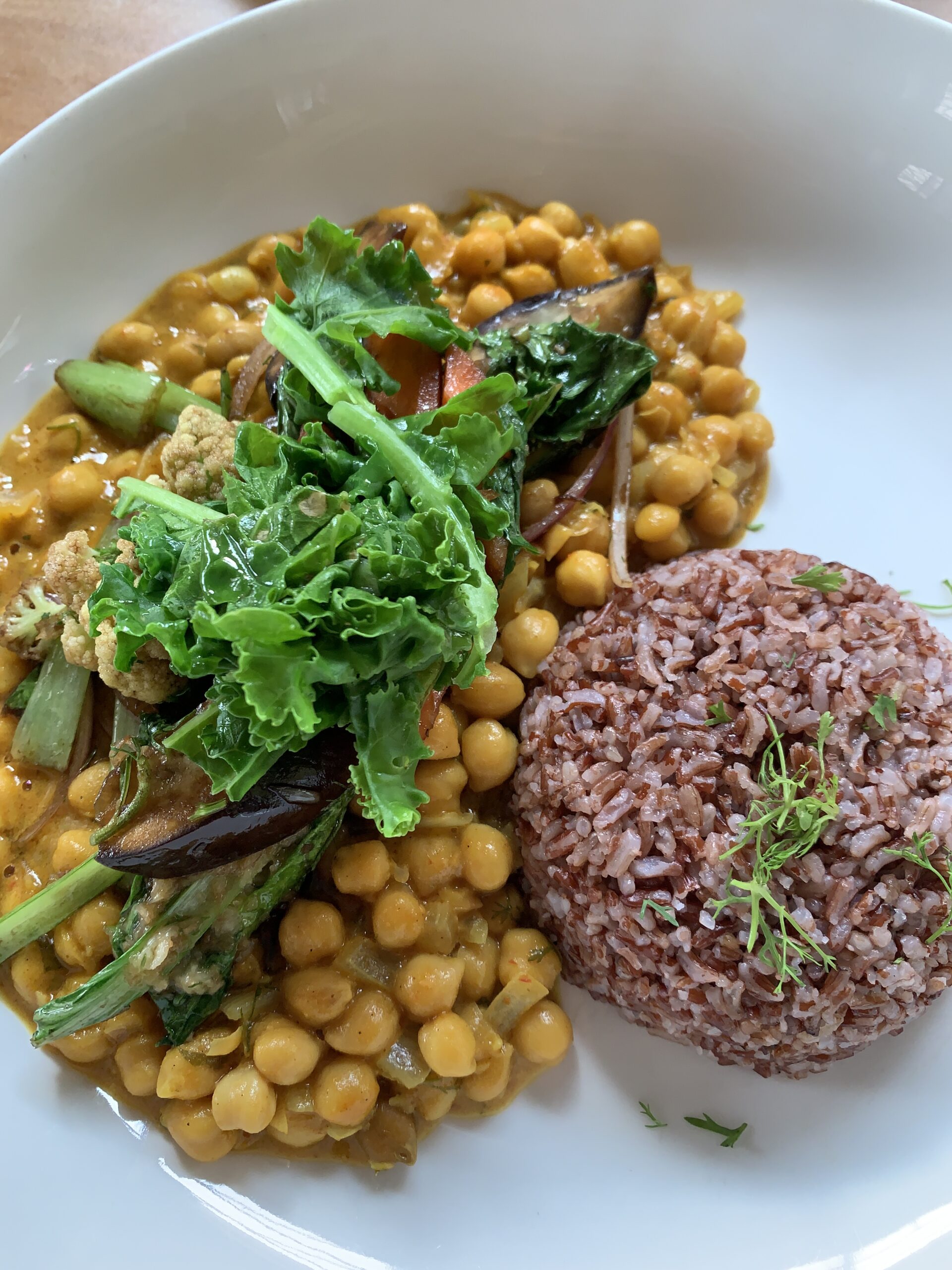
Bella Afrik – An outdoor boho-themed Italian restaurant in Osu.
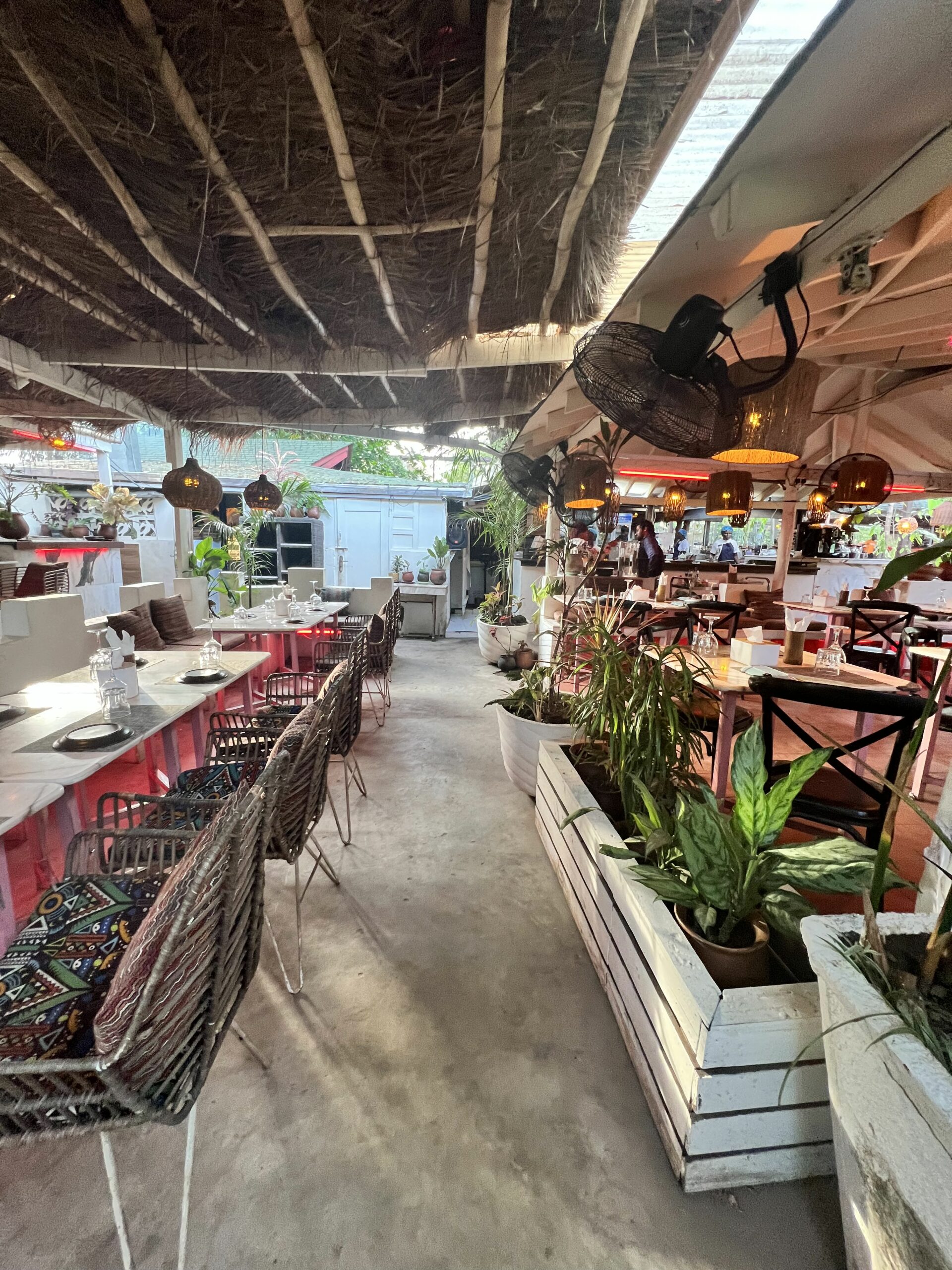

La Gardenia – French-style courtyard restaurant

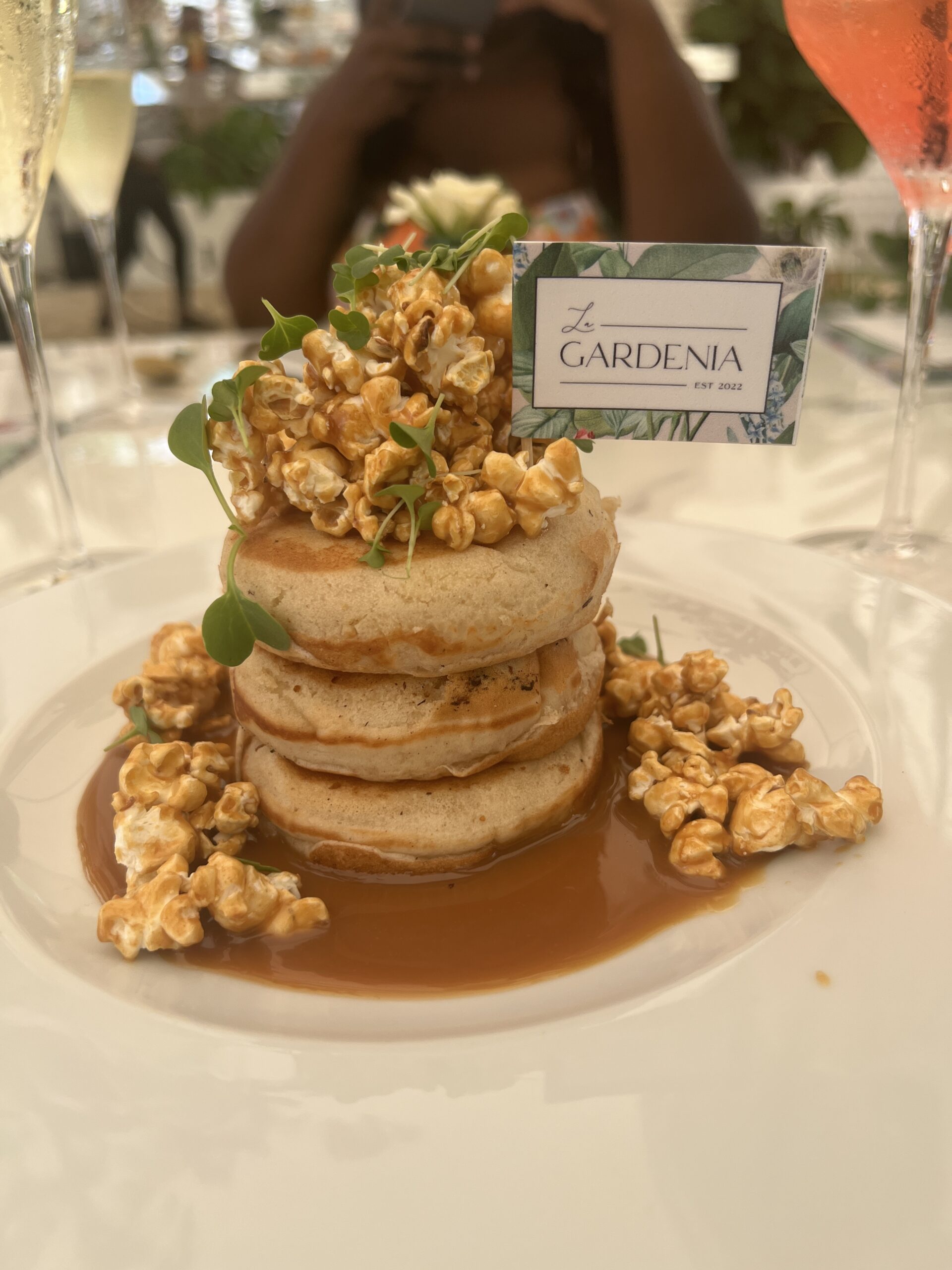
Also, when it comes to restaurants in Accra, expect slow service and mid to horrible customer service most of the time. I’ve noticed that the quality of restaurants tend to decline as time goes on and the industry does not have the best reputation. Everyone has a different experience and I have had great service at places known for bad customer service so take every review with a grain of salt!
Food Delivery in Ghana
Food delivery in Ghana is a convenient way of getting meals because most delivery drivers deliver using a motorcycle. There are many food delivery apps, but Glovo, Jumia Food, and Bolt Food are the most common.
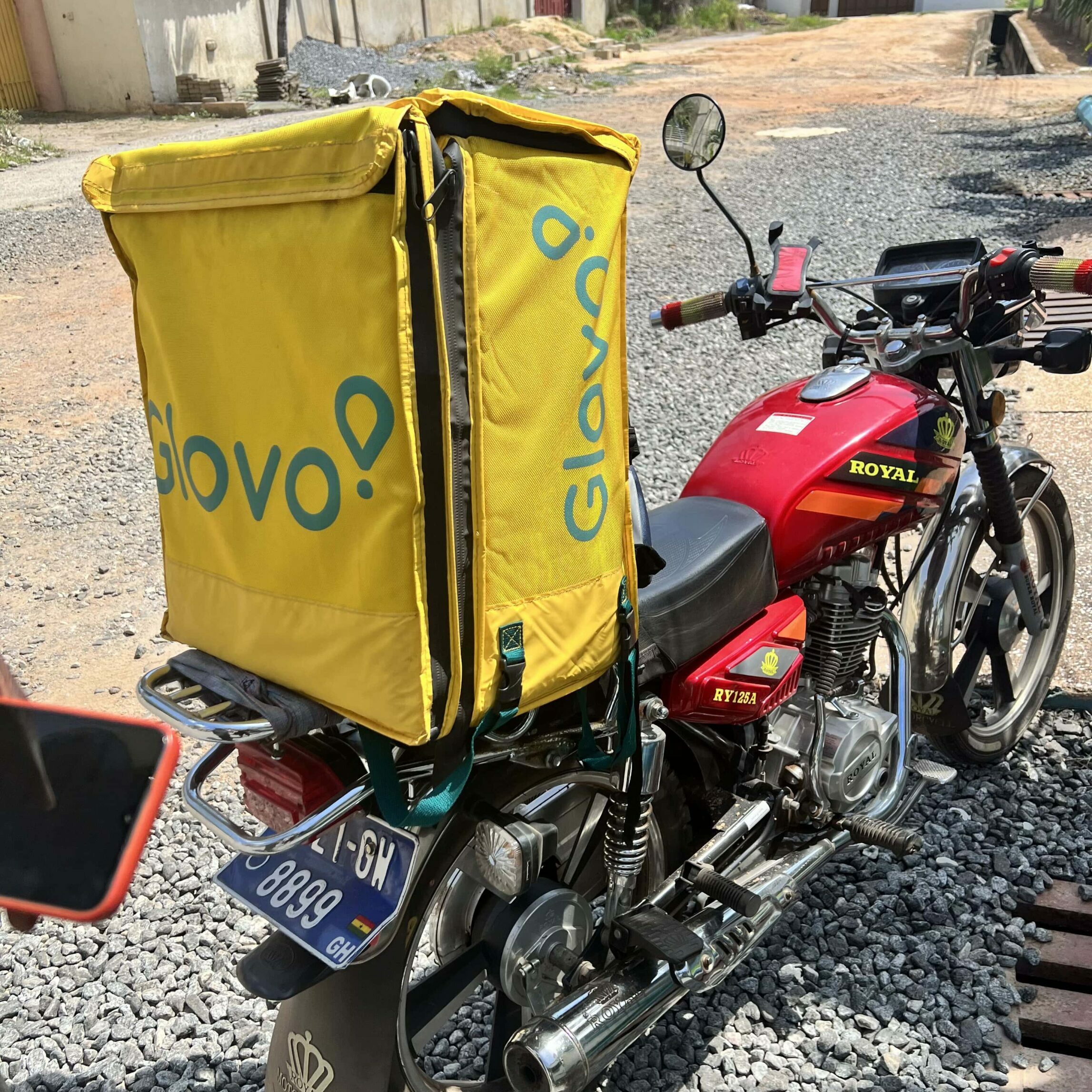
In Ghana, many places do not have official addresses, so you will have to use a nearby landmark or give the driver directions if your accommodation is not recognized on the app’s map. This can make getting deliveries tricky sometimes, so try to have a local like an Airbnb host or hotel staff member speak to your delivery driver for you to make it smoother.
Things to do in Ghana
There are an endless amount of things to do and activities to attend in Ghana. I lived in Ghana for two years and didn’t even get through half of my bucket list for the places I wanted to visit in the country.
There’s so much to do and many tour sites in Ghana that I would be here all day trying to list them all so I’ll keep it cute and organized for the sake of length.
Here are a few key things to do in the popular cities with links to my other blog posts that share even more!
Things to do in Accra
- Take a tour of the Independence Square
- Visit the W.E.B. Dubois Centre
- Shop at the Accra Arts Center for souvenirs to take home
- Learn about Ghana’s first President at the Kwame Nkrumah Memorial Park
- Stroll the streets of Makola Market, one of the largest markets in Ghana
Read my list of over 80 Things to do in Accra here!
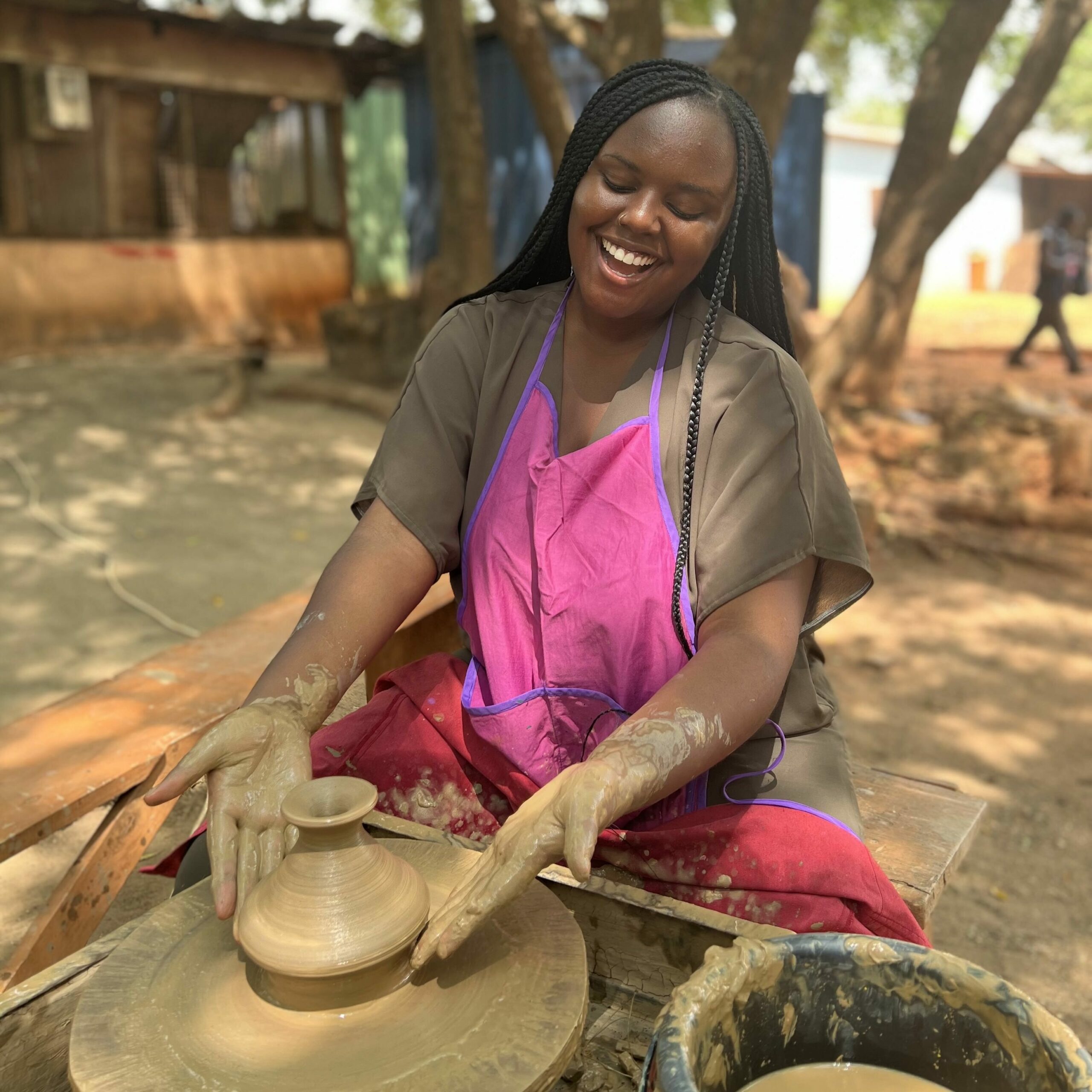
Things to do in Cape Coast
- Embark on the canopy walk at the Kakum National Park
- Recount history at the Cape Coast Castle
- Have lunch at the Oasis Beach Resort
- Ride a tuk tuk (called pragyas) around town
- Visit a fishing harbor
Read my list of Things to do in Cape Coast!
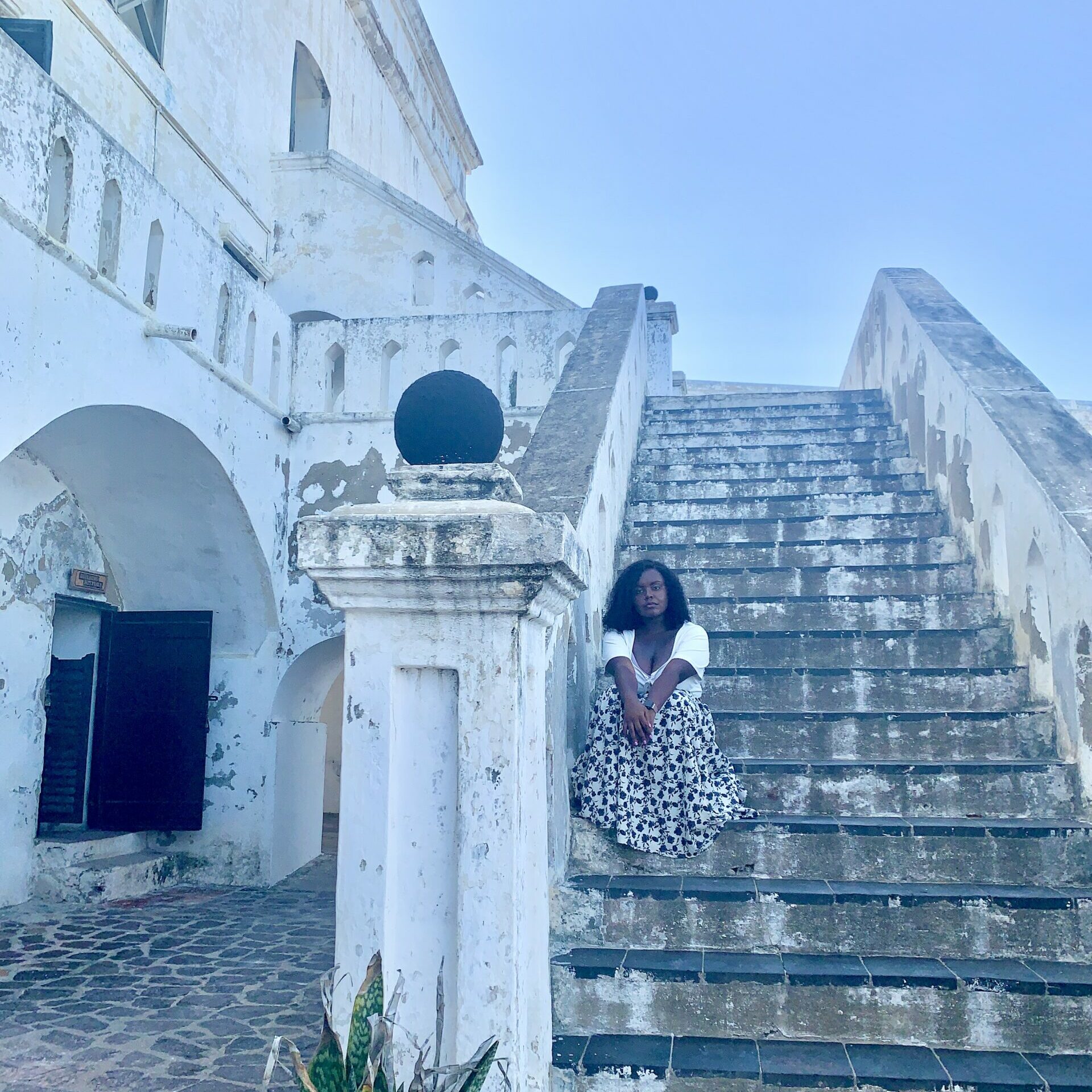
Things to do in Kumasi
- Tour the Okomfo Anokye Sword Site
- See the animals of the Kumasi Zoo
- Purchase colorful fabrics at the Kejetia Market
- Learn the history of adinkra symbols at the Adinkra House
- Weave kente cloth and participate in a naming ceremony
Things to do in Tamale
- Cruise on a safari at the Mole National Park
- Have lunch at Zaina Lodge
- Visit the Mognori Eco Village
- Learn the history of the Larabanga Mosque
- The Mystic Stone
Read my list of Things to do in the Northern Region of Ghana here!
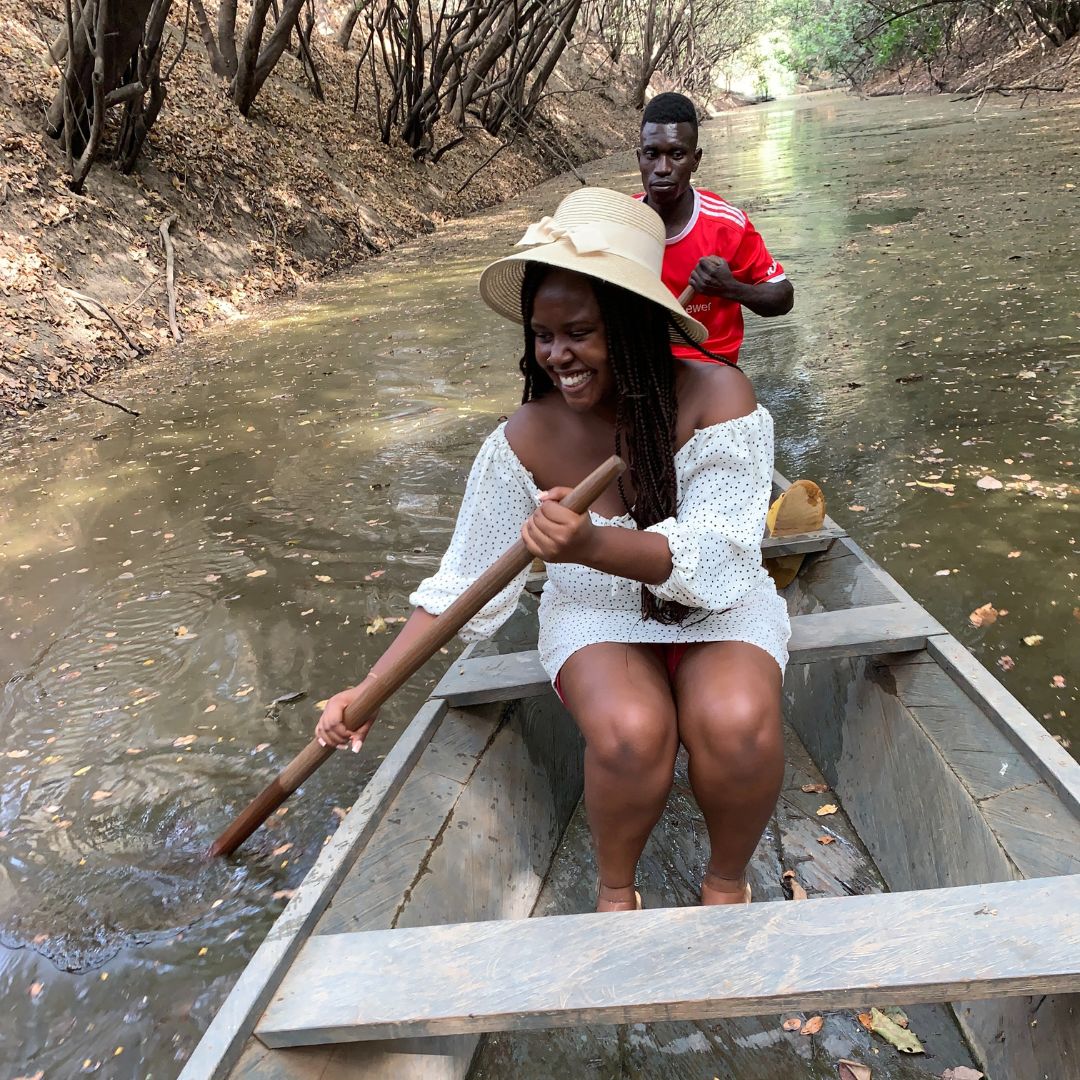
Things to do in Takoradi
- Visit the Takoradi Mall
- Ride the Sekondi-Takoradi train to another neighborhood in Takoradi
- See the Nzulezu Stilt Village
- Take a trip to the Lou Moon Resort
- Stop by Kwame Nkrumah’s Home
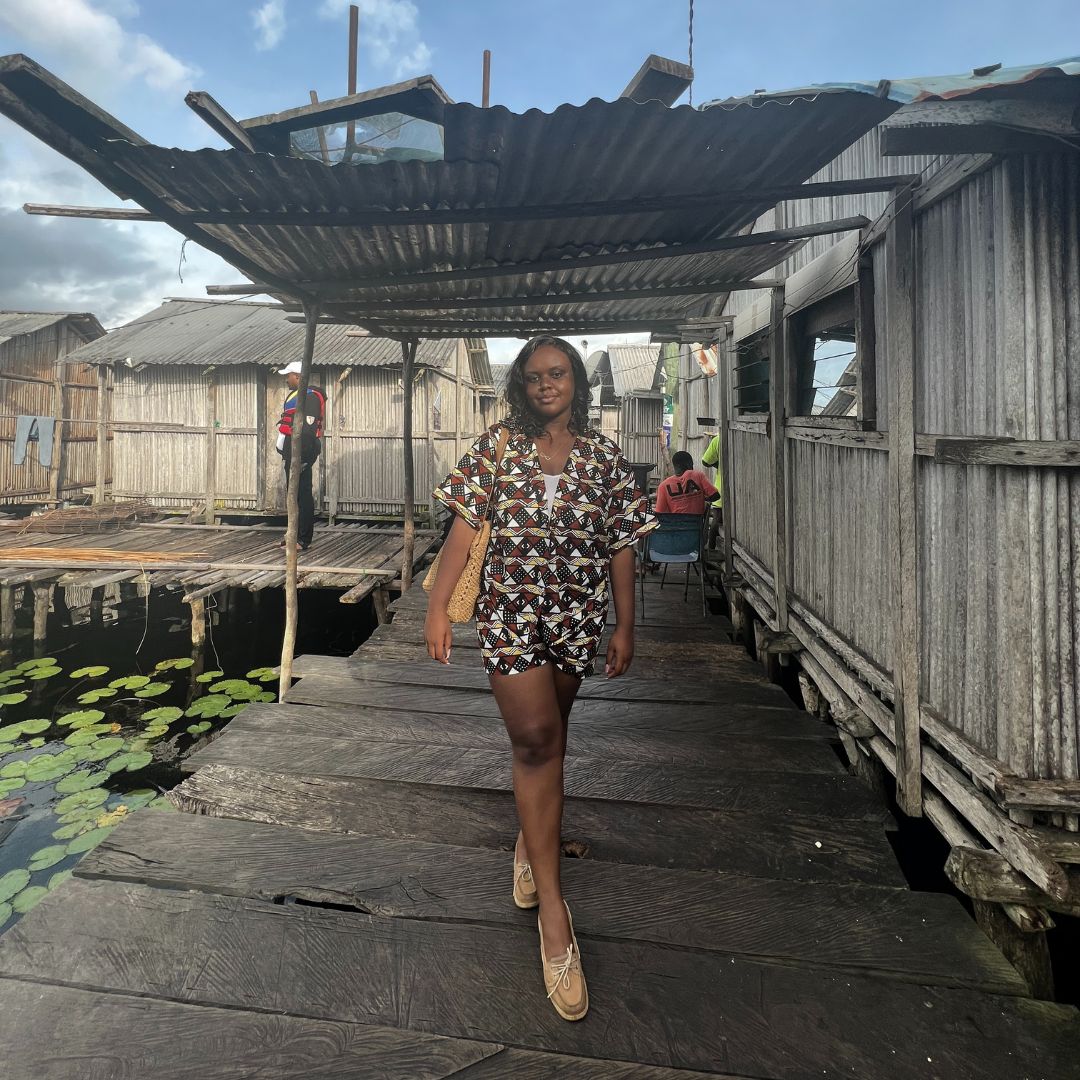
Ghana Tour Companies and Tour Guides
- Mooove Africa – This company is great for day trips from Accra. They can also curate trips around Ghana.
- Travel Time Africa – Private, group, honeymoon tours around Ghana
- Shani Pino – Shani is a tour guide in Tamale that I use when traveling to Northern Ghana. He is great at helping me get around the region, negotiating, and is super chill! You can contact him via Instagram.
Nightlife in Ghana
Nightlife in Ghana is a vibe, to say the least. Even if you are not a nightlife person I highly recommend having at least one night out in Ghana just for the experience. The booming sounds of Afrobeats, the elaborate footwork, and parties not ending until 5 am the next morning is something you have to experience just for the fun of it. Ghanaians know how to have a good time, and there is always a party or event happening.
While you can relax at a lounge any day of the week, Fridays are the best nights to go out. That is when the scenes are booming, with people ready to let the steam they’ve accumulated from the work week out. Of course, Saturdays and Sundays are great nights to go out too, but there’s nothing like a Friday out in Ghana!
Nightlife venue options in Accra are endless, but in other cities can be harder to find depending on where you go. In these cases, the nightlife is usually a party on the beach or a local pub that people use to gather and have a good time. Going out solo for nightlife is generally safe due to Uber options available and many people being out at night. Use Uber instead of Bolt because it lets you see where the driver is headed on your way home.
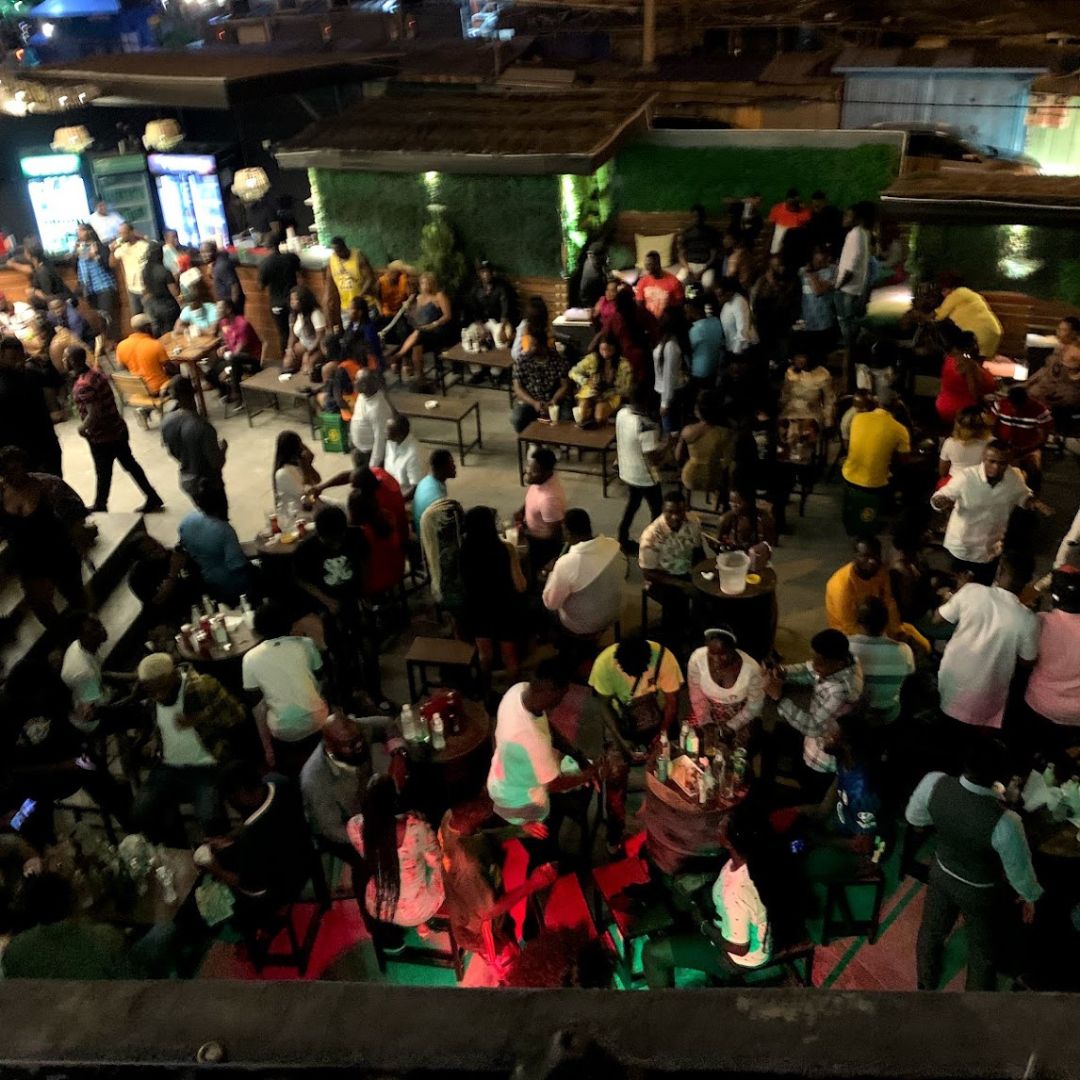
Nightlife Venues to Check Out in Ghana
- Garage – East Legon, Accra
- Firefly Lounge – Osu, Accra
- Republic Bar and Grill – Osu, Accra
- Hutchland Beach – Cape Coast
Shopping in Ghana
There are malls and markets located throughout Ghana where you can shop for clothes, accessories, groceries, and anything else you may need. A majority of your shopping can also be done on the roadside at stalls merchants usually have set up along the road. It is always best to have cash for this shopping and a variety of bills, as change is limited.
Here are two common stores located around Ghana and what you can find:
Melcom – A one-stop shop for groceries, beauty, home appliances, kitchen supplies, and everything else you will need. It reminds me of a Ghanaian Walmart! I recommend Melcom for things you may need around your house more than groceries.
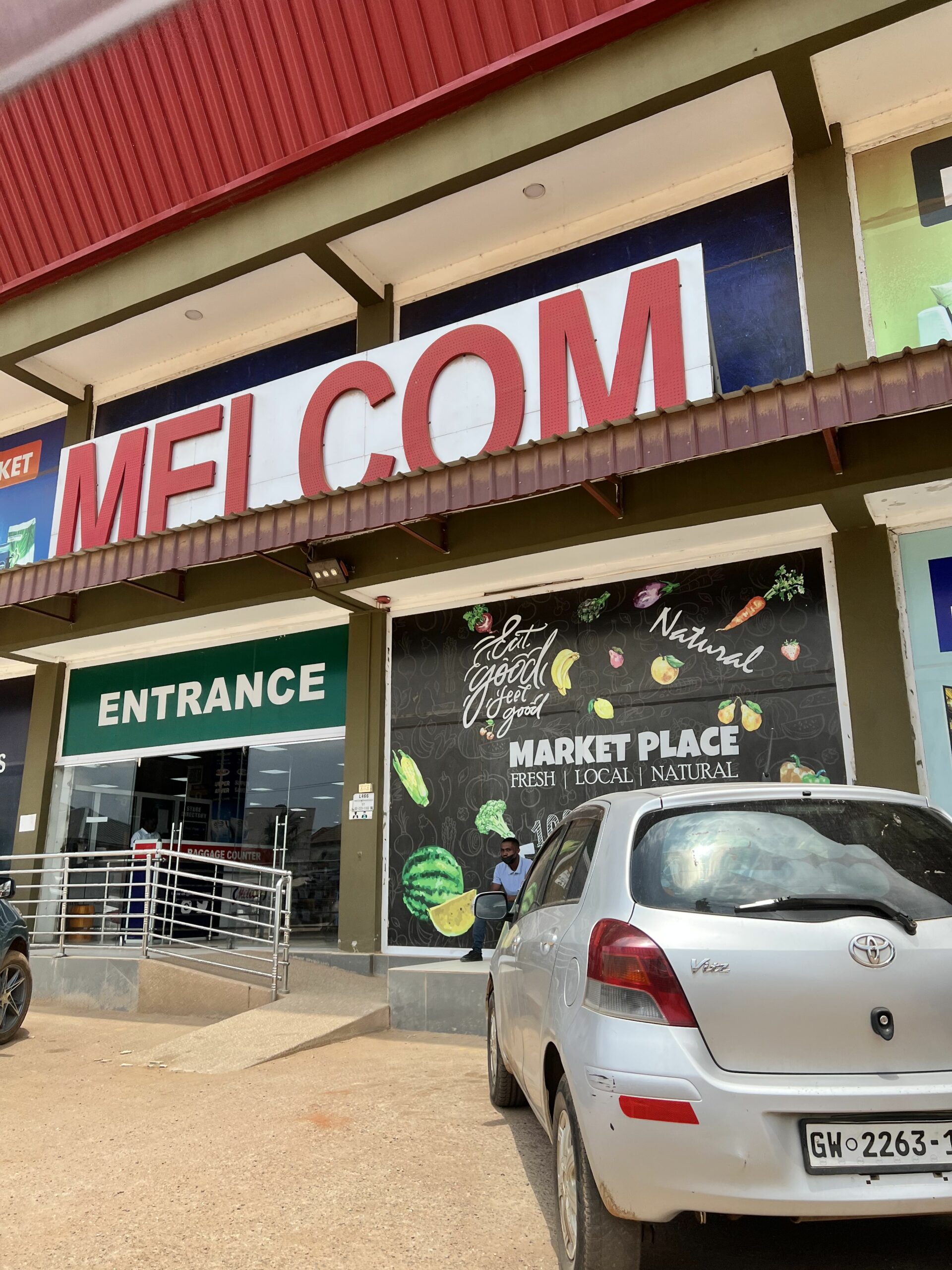
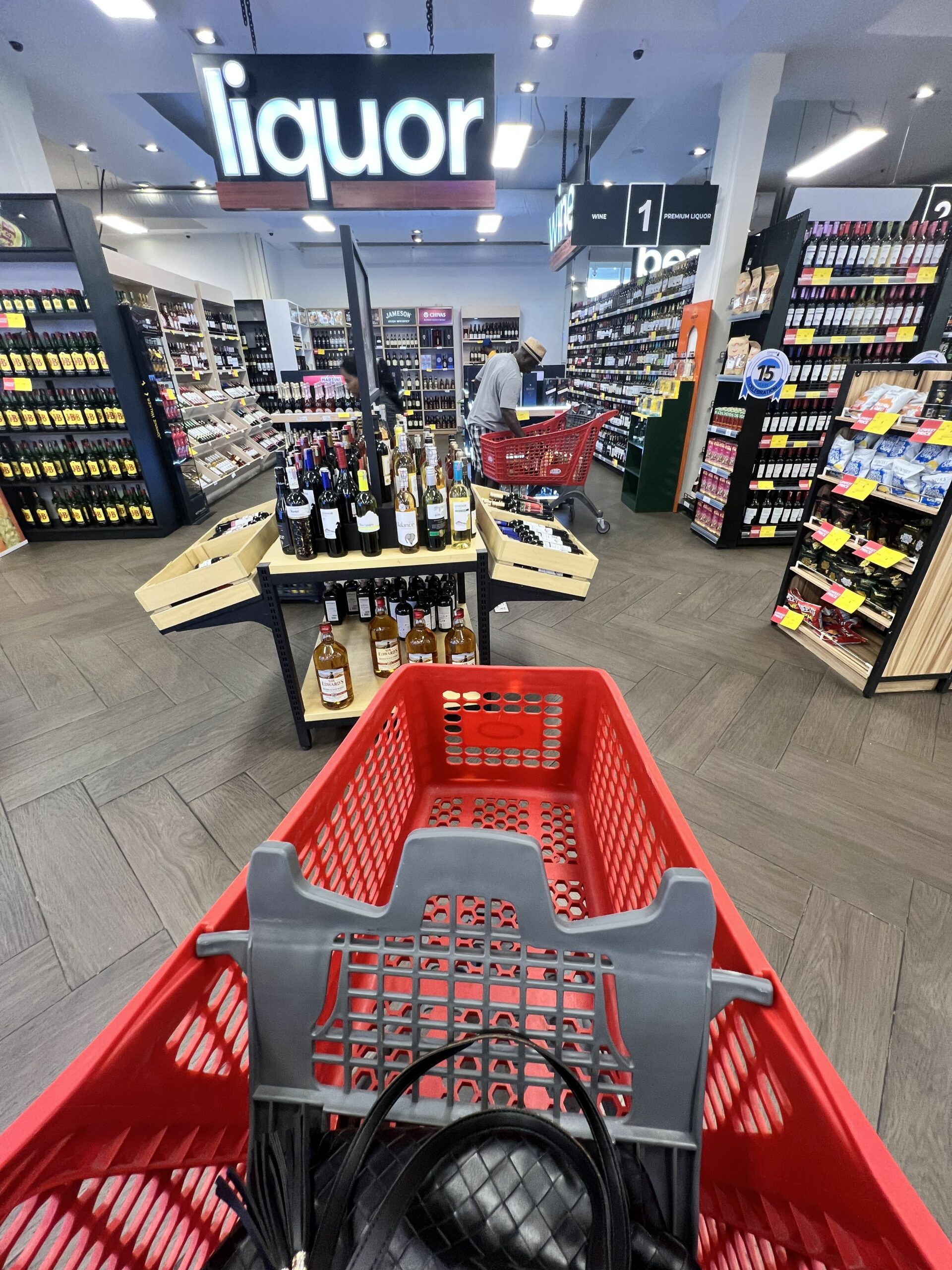
Maxmart – Maxmart locations sell mainly grocery items and are popular because they carry many American-name products that can be hard to find in Ghana. They also sell retail items (lower stock) like beauty and cleaning items. However, in comparison to other shops in Ghana, Maxmart is pricey.
Accessibility in Ghana
Ghana is admittedly not the most accessible-friendly destination from what I have seen.
However, it can be accessible depending on the establishments you visit. There are not many sidewalks readily available for wheelchair users, so it may be best if private transportation is utilized when visiting Ghana.
The rocky roads and abundance of people everywhere make it even more of a challenge. Elevators are not available for most multiple-story buildings, as staircases are built in place. Many bathrooms do not have handlebars, and the list goes on. While the lack of certain structures can make certain activities challenging, I do believe that with proper planning, a trip to Ghana is possible for those with physical disabilities.
I found this article from 2016 stating that “Less than 10 percent of all public buildings in Ghana are accessible for persons with disabilities. This means most buildings (90%) in the country are not easily accessed by persons with disabilities.” While I struggled to find updated statistics from 2021, I still think Ghana has a long way to go before being considered inclusive in terms of accessibility.
Water and Electricity in Ghana
Ghana is known for electricity and even brief (1 hour or less) water outages, so brace yourself! I recommend bringing at least 2-3 portable chargers to Ghana. One of which you save at your accommodation in case of a power outage, and you have to charge up your devices. If you are staying at a hotel, there is a high chance that there will be a generator, so you won’t have to worry too much about the electricity going out, but this is something to be mindful of on this side of the world.
Final Thoughts on Ghana
Your trip to Ghana will be one to remember. Ghana is my favorite country to date. There is something about this country that will bring a calming spirit to you and make you want to return after your first visit. As a visitor, I do not doubt that you will have a great time in Ghana.
I hope this Ghana travel guide has made you even more excited about the memories you will make during your time here in Ghana and has told you everything you need to know about visiting Ghana.
Have you ever traveled to Ghana, or have you been waiting for your trip to happen? Was there anything surprising that I mentioned in this guide? Leave a comment below if you have any questions about traveling to Ghana and be sure to check out my other posts about Ghana!
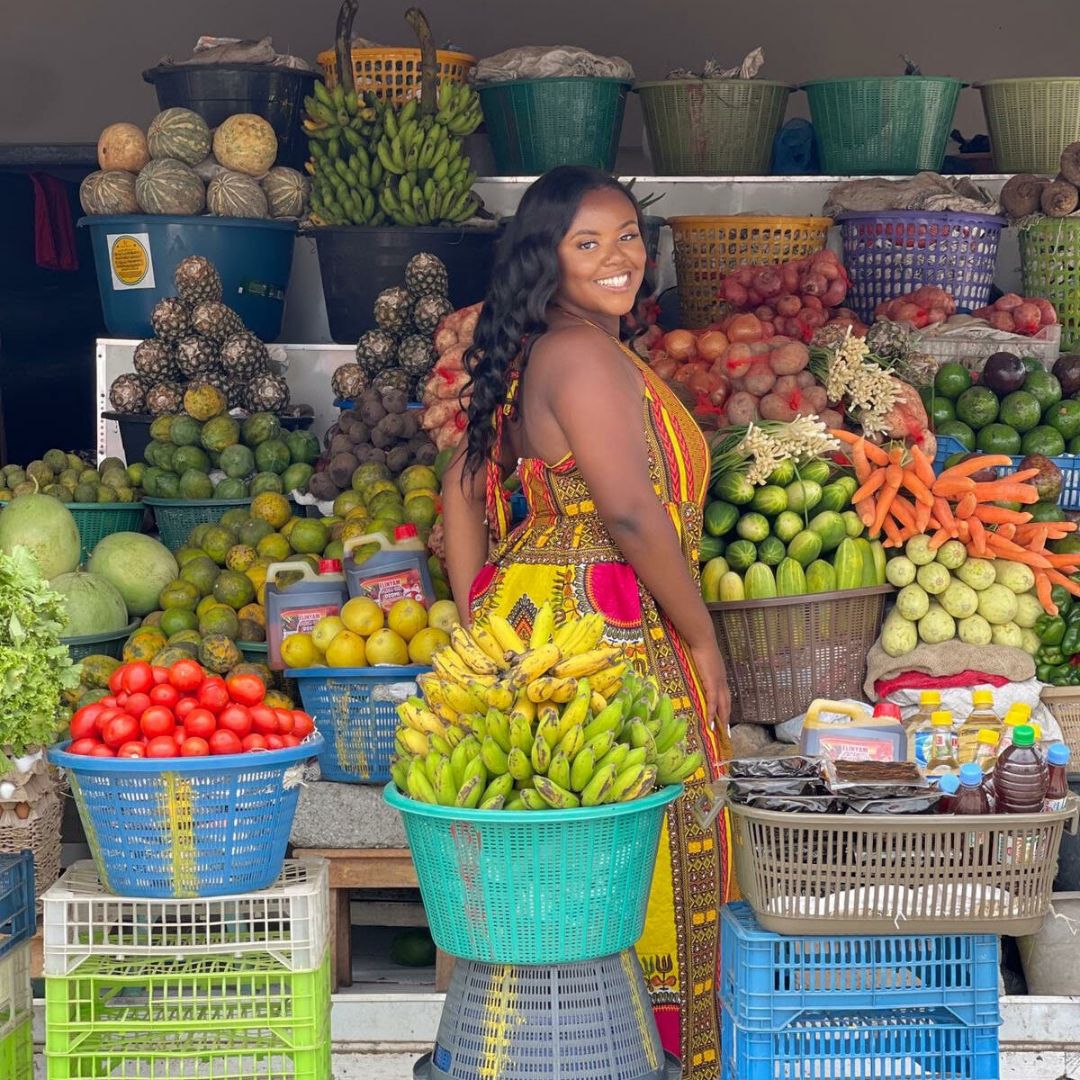

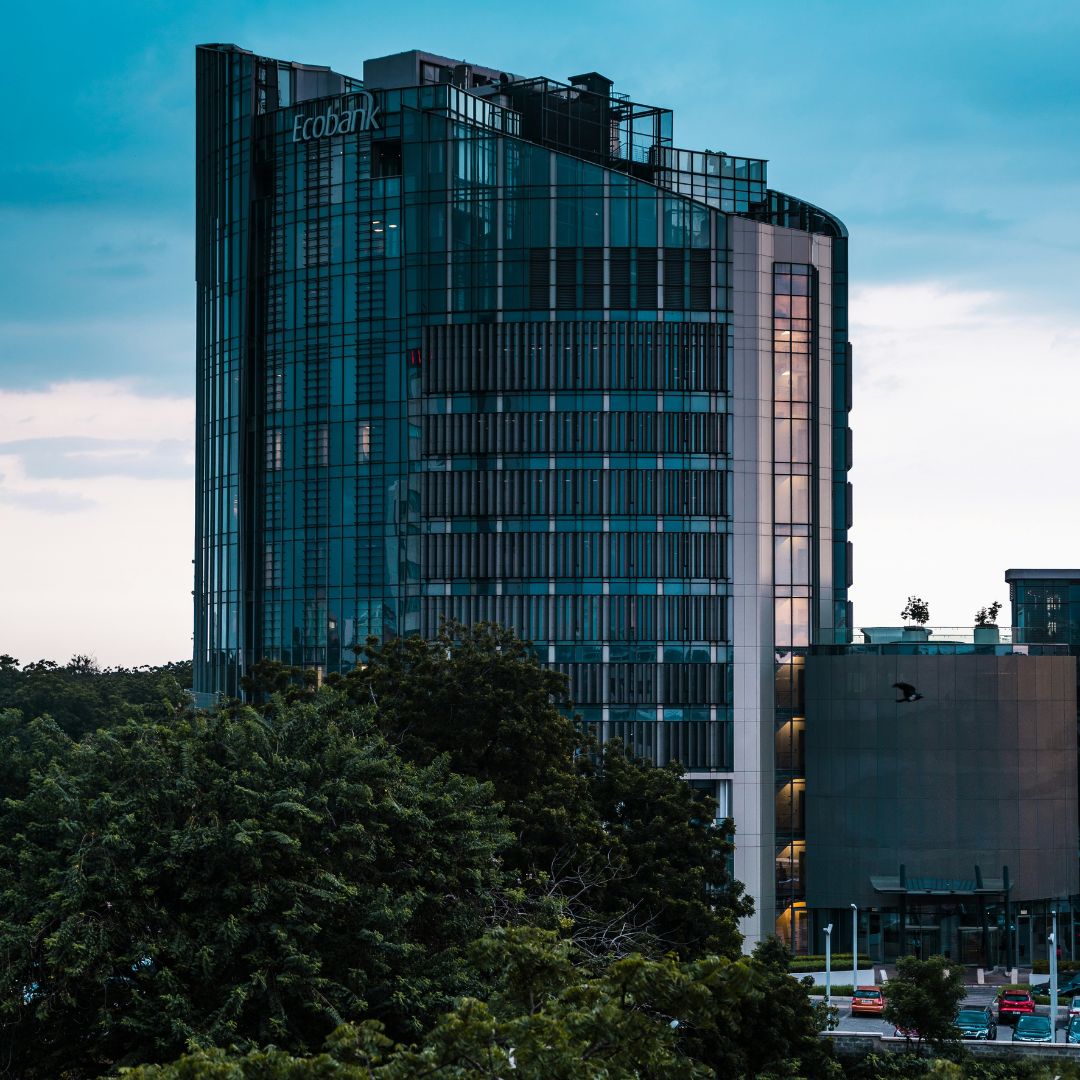





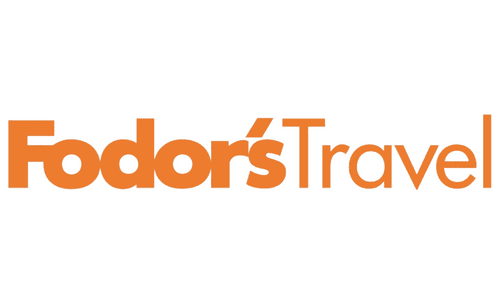
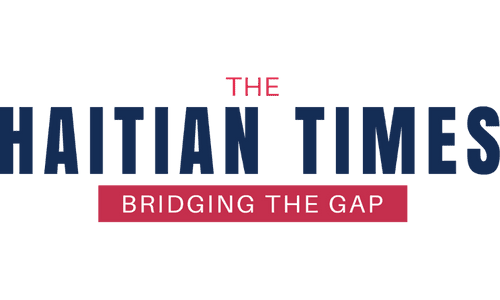
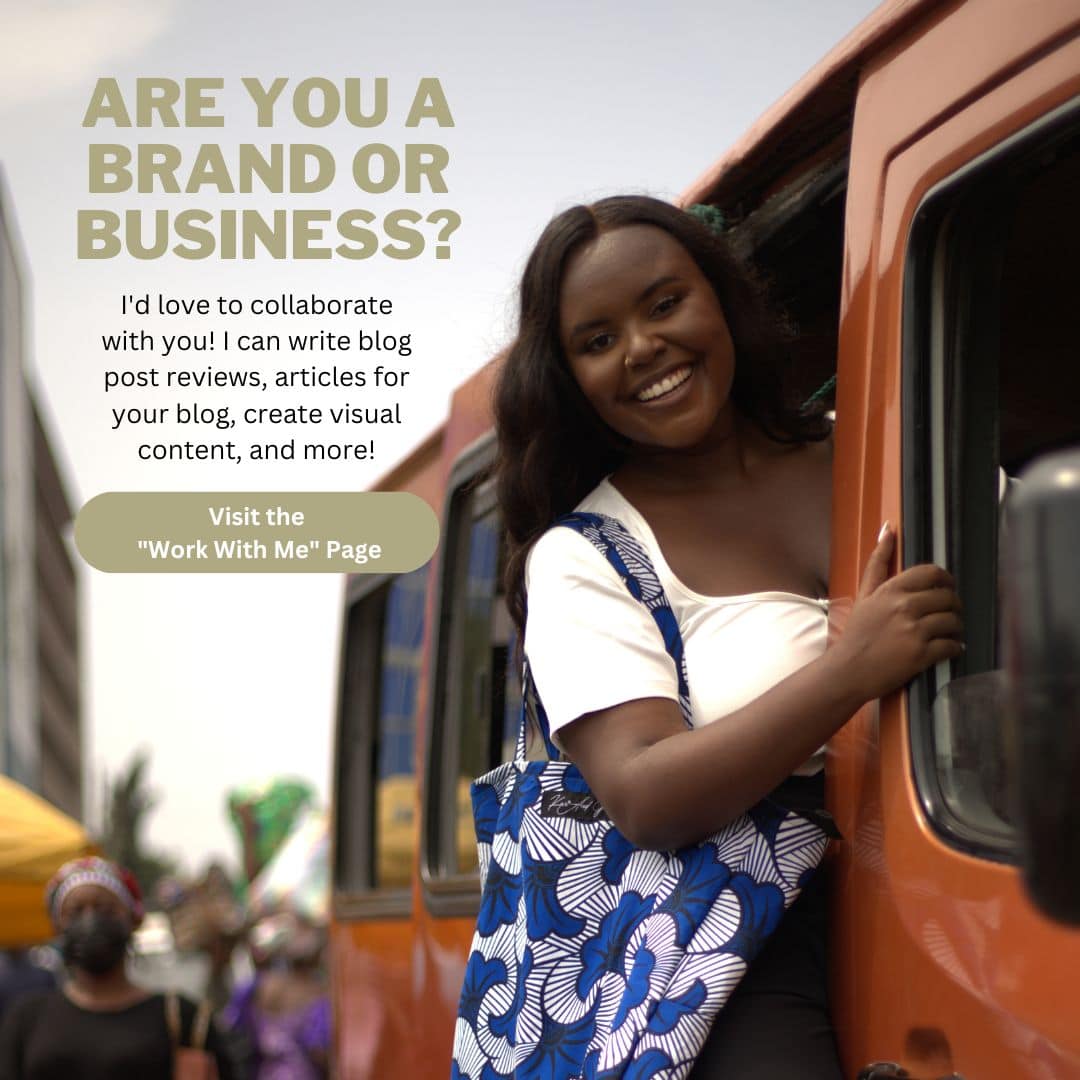

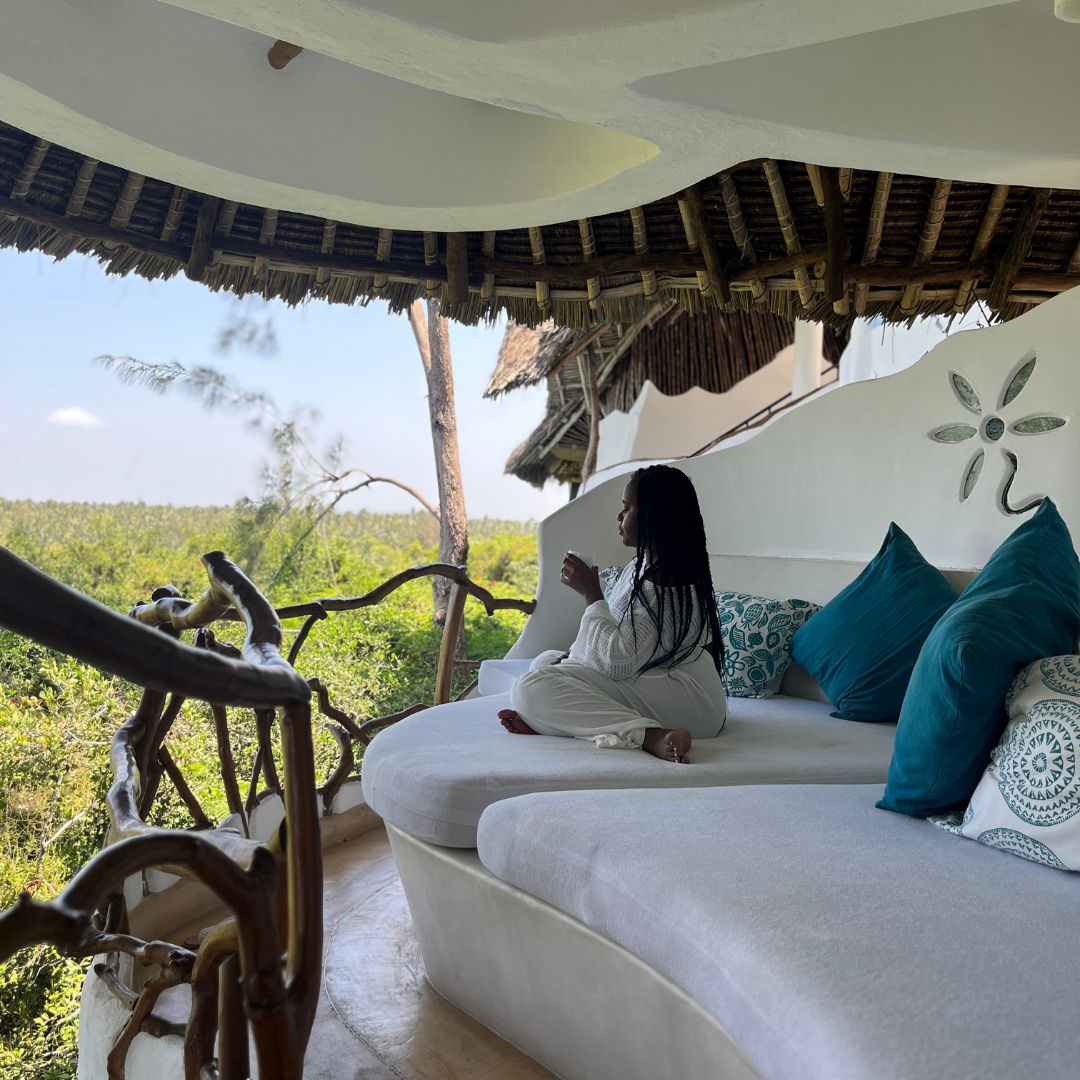
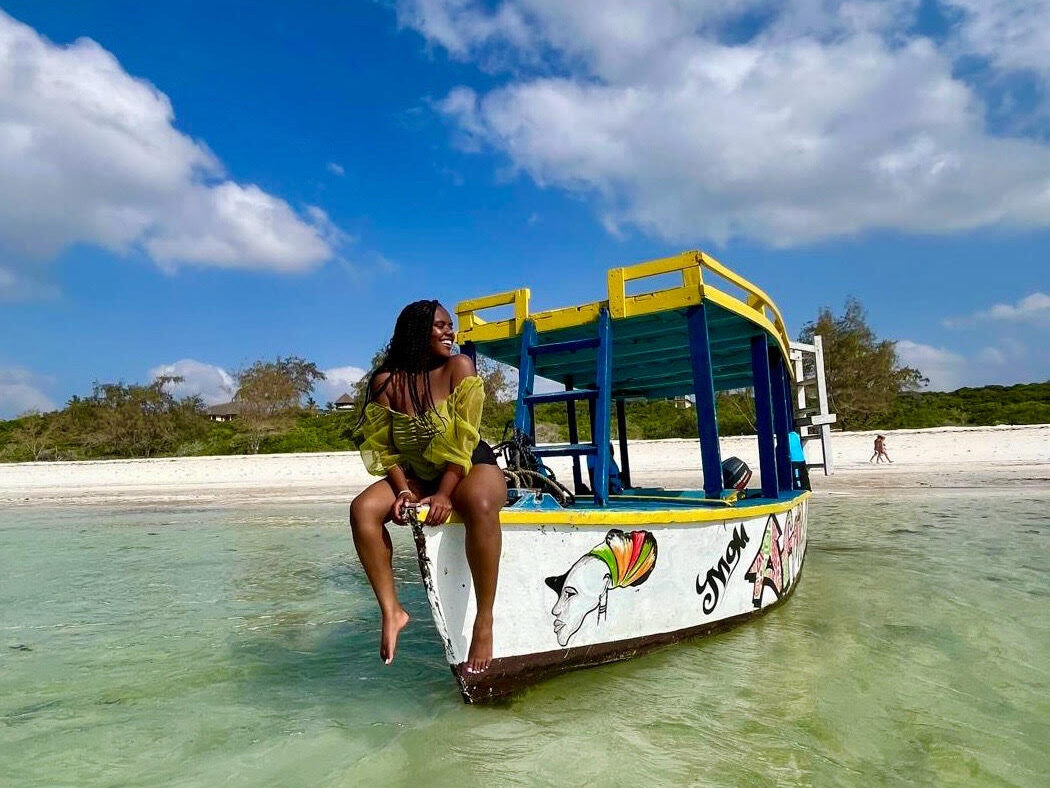
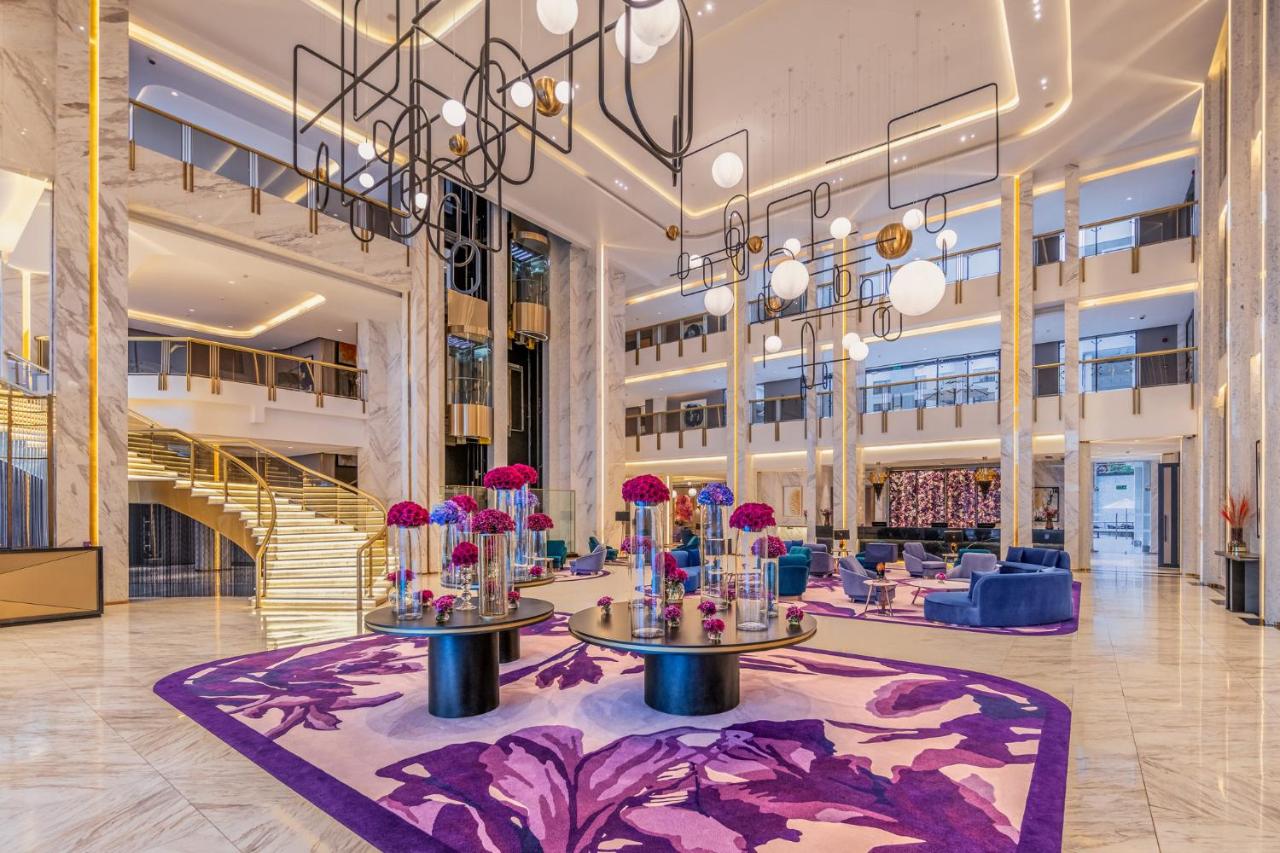
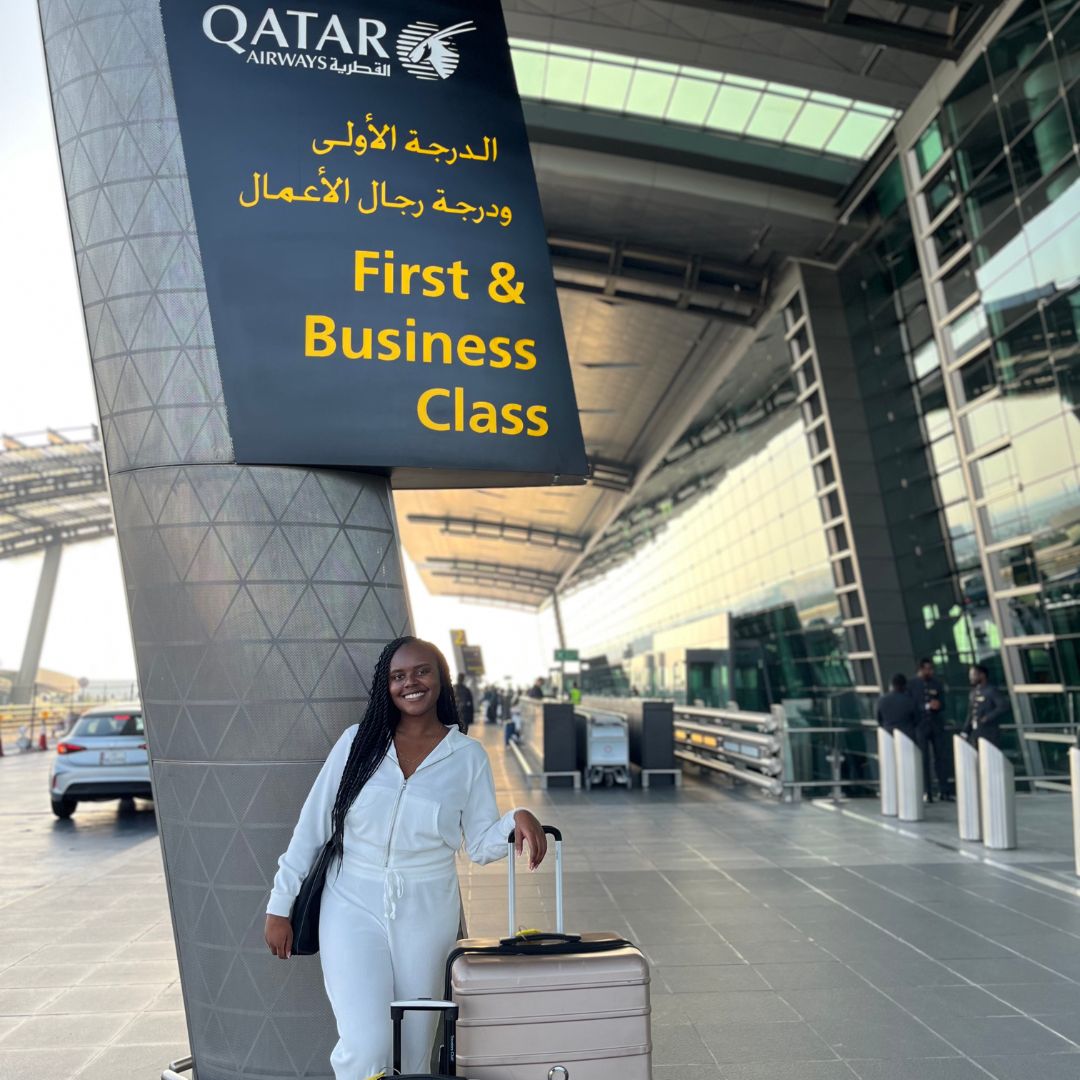

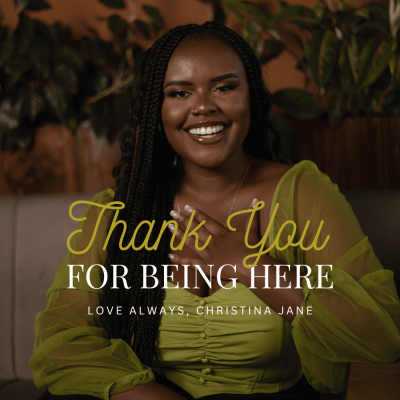
29 Responses
I loved this ! I’m am traveling to Ghana in December so all of this was so helpful! Thanks girl!
Hi Alyssa, I’m so glad ?? You’re going to have such a great time ❤️
Thanks for all the tips! I’ll be there in December!
Yay! So far December has not disappointed so you will have so much fun 🙂
great tips
Thank you for reading!
Thank you so much for this. I found this link from a Facebook group and it has blessed me so much while trying to plan a trip for my birthday. Be Blessed!
I’m so happy to hear it was helpful and hope you have a great trip! Let me know if you have any more questions!
Great info…looking to travel Dec 2024…Doing my research now, thank you for this!!!
Wow! So much helpful information. I will be traveling to Ghana in May this year. I’m super excited and more informed now. Thank you
Hi Lovely, yay! You’re going to love Ghana and have so much fun 🥰
❤️🙏🏽
I plan to tour Ghana along with my wife around the 1st of October 2024 for 1 week can you give me an estimate how much spending money only you would recommend in both United States dollars and Ghana cedis
Hi Jerry,
Honestly it has been a few months since I’ve been in Ghana and I think it depends on a lot like whether you plan on eating more local food vs what can be considered as higher end establishments, Uber vs trotro, etc. so I tend to shy away from giving exact amounts as it’s hard to say.
But if you are planning to only stay in Accra, I would bring $2,500 to be safe and with the understanding that you most likely would not spend it all.
I would change around $200 at a time and keep the rest in your bank account, as ATMs are readily available.
Have a great trip!